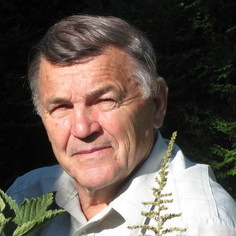
Бесплатный фрагмент - Remember this! Don’t let it sink into oblivion! Second edition
The life and death of the Pioneer Base «Oceanrybflot»
Dear reader! This is the second edition of the book of the same name. It contains significant additional material and describes the history of the appearance in the Soviet Union of one of the largest in the west of the country, the modern at that time fishing organization “Pioneers base “Oceanrybflot”. The country’s leadership appreciated the team’s labor achievements. Perestroika destroyed the city-forming enterprise to the ground. However, people’s memory cannot be erased. Read it, dear reader, and remember this. Excuse me for my poor English translation of this book.
Preface
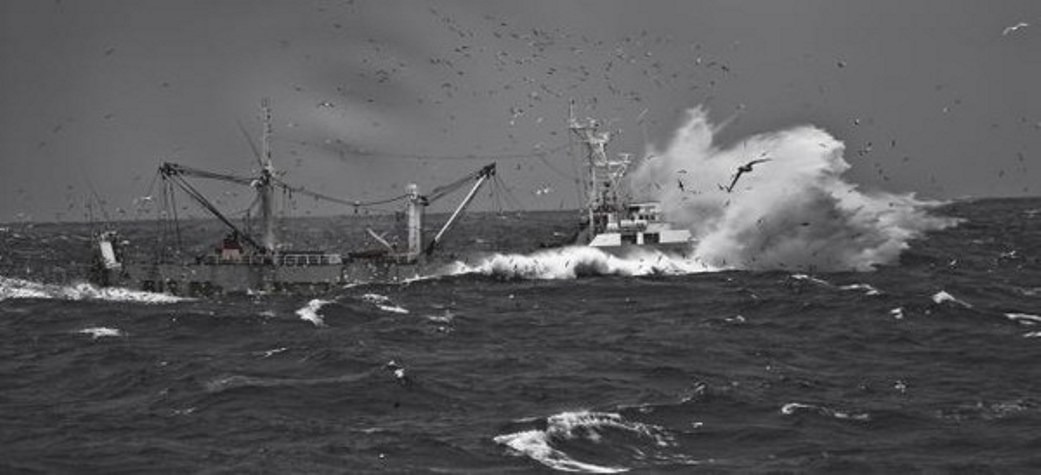
Ships swoop on reefs because of someone’s fault
And perish in the deep of the sea forever.
The memory of them dies on the century sometimes
By our fault, of our fault with you.
In order not to feel guilty, I will leave some trace in the memory of the young generation of the fishing town of Pioneersk Kaliningrad region, whose grandfathers and great-grandfathers worked in this base. While my memory is still alive, I publish my memories of my work in this largest fishing organization in the West of the Soviet Union — the Pioneersk base of the Ocean Fishing Fleet (PBORF).
On July 30, 2014, a film about the city of Pioneersk Kaliningrad region was published in the Internet. The author and presenter of this film is a Yulia Bondareva. Who has not seen it, I advise you to see.
The author found on the pages of history many interesting things about Neukuhren (the past name of Pioneersk). Here, at one time, prepared pilots category “A” fascist Luftwaffe, agents-telegraphist to throw in our deep rear during the Great Patriotic War.
Reminding about the pilots of Luftwaffe, Julia made me take out from the piggy bank of my memory remote 1942. I don’t let it sink into oblivion. I will remember for the rest of my days on August 23, 1942. On August 10, 1942, I was four years old. My father was at the front, my mother still continued to work at the factory, which instead of tractors for collective farms, produced and repaired tanks for the front. People worked in the workshops, but the pilots of the Luftwaffe of fascist Germany constantly bombed the recalcitrant city. When was bombings, my grandmother and I were holed up in the basements of our four-floor house. My mother was going through bombings in the workshops of the tractor factory. On that day we were not destined to perish, as many old people, women and children of our house, who, like us, did not have time to evacuate and lived in the house. The house was completely destroyed. The grandmother somehow managed to get out wich us from the scorching heat.
Hitler’s aces (perhaps graduates of the Neukuhren School), performing the tasks of their Fuhrer, turned my native Stalingrad into solid ruins and deprived us of shelter over our heads. They wiped our settlement in the Tractor factory district of the city. These actions have not sunk into oblivion in our minds. I believe there are still, besides me, living witnesses to those terrible events. My great-grandson and I will have a lot to say about that terrible August 1942. Hundreds of fascist vultures dropped tons of bombs on wound and destroy, but still the resisting city on the banks of the great Volga. Old people, women and children who did not die under the ruins of collapsed houses tried to escape this nightmare. There was only one escape route, along the factory fence away farther from the tractor factory towards the Meshetka River, which stream into the right bank of the Volga River.
My mother drags me with torment through the burning settlement. And she drags me a long time. Of course, I am terrified and roaring loudly. Previously, such a run ended in a dark, damp cellar, where there were already many people. We were given a place somewhere, and we sat quietly together with everyone. Waiting for the end of the bombing. And now I am being dragged somewhere far away. Children’s feet tired, but my mother does not take me in her arms. I have a bottle of liquid in my hand. It is sunflower oil or something. Ordered to carry. And I am to carry. However, you can see it is so destined. Underfoot is not clean asphalt, and broken bricks of destroyed houses, which are also burning. The bottle is broken. I am starting to cry even more. Did not comply with the request of my mother, did not bring a precious liquid. Half-minute calms and run again somewhere.
I see clubs of fire in almost all window openings and on the roofs of burning houses. Sheet-irons which are covered the houses, collapses into some intricate spirals on their roofs. And there is a terrible heat and some rumble from this fire. You can even feel the wind.
When I began to sort through the surviving sheets of documents that had survived those horrors with us, I understood why my mother could not take me in her arms at that moment. After all, it would be more convenient and faster to escape, I thought. The wound has not healed yet, the splinter also makes itself felt. In one hand she has to hold a knot with some things and documents, and the other sick hand to drag a roaring child. It will be understood later. My mother was able to register her disability only in April 1946. Moreover, in April 1963, when an X-ray appeared in the clinic, the mother’s sanitary passport made a note: “Right at the level of the 1st rib there is a other body (splinter).
And Hitler wanted so much to take over this city. But Stalingrad, which became a stronghold, stopped the advance of the enemy. Soon allowed the Soviet Army to drive him west to his lair, to finally get rid of this fascist plague.
When Julia was finishing her very short story about the Pioneersk base of the ocean fishing fleet, she said usual phrase: “The past achievements have sunk into oblivion.” And that’s where I break through, as she say. Julia did not live in Pioneersk. And even more so, did not work in the Pioneersk base. She is still very young. That’s why she doesn’t know anything about the achievement of the base. Or the formats of the film did not allow her to learn about them. But it was necessary only to pass with the operator to the piers of the port. Here still continue to work for pennies as guards former captains of ships of the base. They could tell a lot about the former achievements of the base. In their memory, these achievements have not sunk into oblivion. Perestroika times destroyed the fishing fleet. And the captains now have to guard empty mooring berths to.
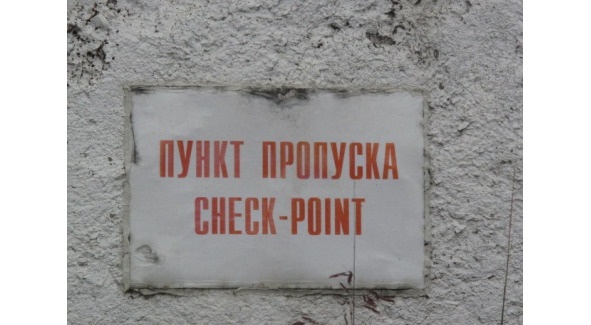
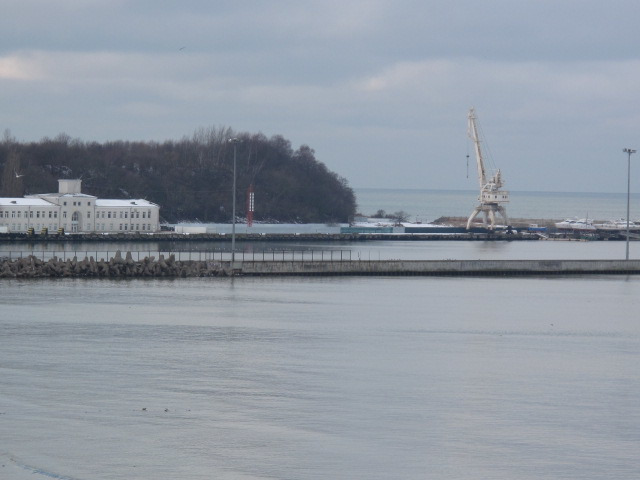
And for young people to know about the achievements of the Pioneers Base of the Ocean Fishing Fleet, I am for Romke — my great-grandson, leave a simple chronicle of those years. It was saved by the oldest employee of our base Zinaida Aleksandrovna Golik. Her first husband perished in the shipwreck of our ship SRTR — 9005 “Deer” in the North Atlantic off Shetland.
She connected her fate with my classmate of the Odessa Maritime School — senior mechanic Golik V.I. Zinaida Aleksandrovna is familiar not rumored with the sea. Almost all her life was spent in the port. It just so happens that she became the widow of a sailor again. God gave her health. It would seem that it is possible to retire. However, she continues to spend the rest of her energy on public affairs.
The Pioneersk base of the ocean fishing fleet, which was transformed into the Open Company in 1998, is long gone. By some miracle, Zinaida Aleksandrovna managed to save two small rooms in the building of the former human resources department for the former employees of the base. Former captains and senior mechanics of the Pioneersk Base, united in the Pioneersk branch of the Kaliningrad Association of Sea Captains, are still sheltering here. Once a month they are collected by the organizer and chairman of the association Artushkevich Vitaly Konstantinovich.
Grey-haired sea wolves continue to actively live and participate in the public life of the city. But by early 2019, the captains of the Association of Sea Captains were deprived of these two rooms and they are practically forbidden to visit the port.
In order to preserve and abandon the memory of the base, Zinaida Aleksandrovna took five stands from the basements of the Rantava Historical and Archaeological Museum with great difficulty.
These stands were created by the base workers. And when the base completely disappeared, the stands were handed over to the museum, hoping that the entire history of the base would be recreated.
But that has not happened yet. These priceless stands were created in those distant times when the base had a large fleet and was famous for its achievements throughout the country. The initiator of the creation of these stands was the party committee of the base. All the information for the artist was supplied by the party committee and the planned department of the base. And these achievements should not fall into oblivion.
The human resources building is still alive. These stands were installed on the third floor of the building. Everyone who came here could see them. Moreover, I decided to put this record on the Internet. Maybe some of the young people will come to the site: “Male. Ru. Blog. Vyacheslav Simonov. The history of the Pioneers base “Oceanrybflot” and learns something new.
He will see the names of his fathers, grandfathers, and great-grandfathers who worked in the base, and photos of the still-living witnesses of those labor achievements of the base workers. This should not fall into oblivion.
But suddenly I ran into my conscience. She asked me to stop the work I started, believing that I was becoming a plagiarist. Then, in my opinion, a great plagiarist is one of the employees of the historical and archaeological museum “Rantava” who published the texts of these five stands on the museum’s website. The article is written in small white print on a black background. And it seems that the history of the Pioneersk base of the ocean fishing fleet is preparing to sink into oblivion. So go away in the night and disappear forever late winter twilight. I don’t really want that. And so I decided to continue my work. I may have rewritten part of my text from these stands, but I will fill it with familiar names and faces of veterans of the base, with whom I worked for many years, saw and knew them in person.
The website "Prussia.39.ru" famous peoples of the Pioneersk town calls the German composer Brust Herbert and the German architect Frick Kurt. They may have been famous in Neukuhren, but no one in the Pioneersk knows them. And there are no desires for this. But the famous people of the Pioneersk town and PBORF I will try to name. And I knew the creator and creator of these five stands. I knew him very well at one time. This is a veteran of the Great Patriotic War Romanovsky Fyodor Ivanovich. He worked wich us in the base as the painter. He lived in Svetlogorsk. His wife, Taisiya Vasilyevna, born in 1924, worked in the Svetlogorsk polyclinic as an ambulance paramedic with my wife. So, continuing this work, I will strive to ensure that this work (five stands) of the party committee of the base, the planning department and the veteran of the Great Patriotic War also does not sink into oblivion.
And so. In April 1945, bloody battles continued. The backbone of fascism was not broken still, the Soviet flag over the Reichstag was not installed, and the leaders of our state were already thinking about a peaceful life. East Prussia was still fiercely resisted. But by the decision of the Yalta Conference in February 1945, part of it had already departed to the Soviet Union. And Neukuhren was that part of Prussia, too.
On April 14, 1945, the Red Army troops took another outpost of the Nazis in the Baltic — the town of Neukuhren. Soldiers of the 292nd and 576th Rifle Regiments (commanders — Lieutenant-Colonels Y.P. Marshavin and I. P. Serdyukov), 115 infantry division under the command of Colonel A. P. Blinov, 43 armies launched an offensive on Neukuhren from the east and from the west. Fascists resisted and we failed to take the city. After artillery training by 3 p.m., Neukuhren was taken after 30 minutes.
In the mass grave, which arose after fierce fighting, buried 150 soldiers of the Red Army. In 1950 year a monument has been erected on Komsomolskaya Street. In 1971, a memorial complex (architects Yuri Flyagin and L. Safonova) was created on the site of the monument and the mass grave. The low rectangular terrace measuring 15 by 20 meters is lined with concrete slabs. Along one side is a memorial wall with memorial plaques installed on it. On the concrete block there is an in-depth image of a flying crane. In front of him is a bowl of Eternal Fire. Along the other is a flower-bed.
In the same battles, our future base worker, Leo Dmitrievich Shevtsov, had to liberate the city from the nazis. He — a veteran of the Great Patriotic War, served in the First Guards Mine-Torpedo Aviation Regiment, which liberated the city from the fascist plague. The son of a hereditary pilot was a regiment technician. Lev Dmitrievich’s father, a participant of the First World War, bombed German positions and ships. In peacetime, he “put on the wing” of naval pilots of the Yeisk Naval Aviation School. And Shevtsov L.D. since 1958 began to work in our base. He worked in the base for 41 years, managed the radio workshop base. A humble, executive, hard-working man. It wasn’t just the base’s radio operators who knew him like this. Everyone who had to work with him had a high opinion of him. That’s how I captured it in May 2017.
Lev Dmitrievich and his wife Vera Ananyevna lived together for 68 years. Vera Ananevna has 57 years of experience. She worked at the sanatorium and the city hospital. The 29-year-old daughter of Shevtsov, Olga Lvivna, who has two adult sons, worked as an economist at PBORF. The younger Shevtsovs respect the elders, often come to visit, provide parents with all kinds of help and support. The Chevtsov couple was awarded the Medal of Love and Loyalty for their devotion to family relationships and worthy upbringing of children. What writes about Leo Dmitrievich Shevtsov in his article by Navy aviation veteran Colonel S. Bortan:
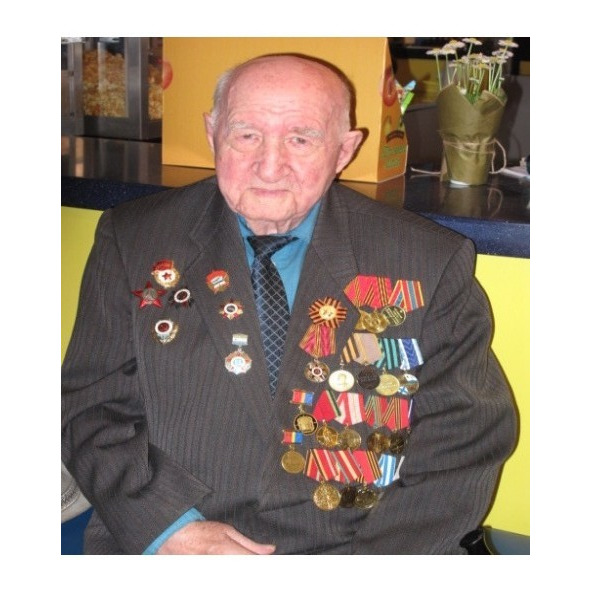
— Lev Shevtsov is the Great Patriotic War veteran. He was born and raised in the family of one of the first naval pilots in Russia. His father Dmitry Nikolaevich, a participant of the First World War. He fought at the front, performed reconnaissance flights, bombed Kaiser positions and ships. During the years of peaceful construction since 1936, Dmitry Shevtsov, as they say in aviation, “put on the wing”, many naval pilots — graduates of the Yeisk VMAU, including pilots, who subsequently fought in the 1st Guards Mine-Torpedo Aviation Regiment KBF Air Force. In 1940, when his health was no longer allowed to fly, D.N. Shevtsov was transferred to the city of Molotov (now Perm) as a teacher at the Naval Aviation and Technical School (VMATU).
Here his son Lev Shevtsov graduated from 7th grade. The Great Patriotic War began. Growing up in an aviation family, the young man did not think of himself outside of aviation.
“There was a Great Patriotic War, We — Komsomols, guys and girls rushed to the front — continued his story Lev Dmitrievich.
— In 1942, after the end of the seven-year period, the military enlistment office sent me to the city of Omsk to the military-aviation school of pilots. During the passage of the military-medical commission, the doctors “cut” me. Their sentence was harsh: “not fit for flight service.” I was recognized as short-sighted.
Returning from Omsk, after a unsuccessful admission to flight school, Leo graduated from another class of school, and did not back down from the decision to become an aviator. In 1943 he entered the VMATU. The brutal war required accelerated releases.
On the fronts of the Great Patriotic War began to receive land-lease aviation equipment from the Allies. In the combat units, the technical staff was not familiar with foreign equipment and had difficulty with its operation. Therefore, in the VMATU during this period cadets studied modern equipment not only domestic, but also foreign aircraft. The student Lev Shevtsov with great desire and perseverance mastered everything that the teachers of the school taught. In 1944, Lev Shevtsov graduated from the accelerated course of the school and graduated as a sergeant — a mechanic in radio equipment, receiving an appointment in the 1st Guards Mine-Torpedo Aviation Regiment of the Air Force KBF, based at that time in Panevezes. The newcomer was assigned to the second aviation squadron, which was commanded by Senior Lieutenant Mikhail Shishkov. The mentor of the young specialist was an experienced, experienced warrior Petty Officer Sharpay.
The frontline weekdays began — the hardest daily combat work. After combat sorties, the planes returned to the base riddled with bullets and shells, literally torn. Technicians and mechanics made every effort to repair damaged machines. They always came to the service first, even before dawn, and always left the airfield last. Worked for days without sleep and rest. At night, by the light of the carriers and flashlights, the holes were patched, repaired and changed equipment.
In addition, it was necessary to disperse and mask the planes from the enemy’s air attacks every time. Sometimes, to mislead the enemy, at a distance from the runway and parking lot, the technical staff exhibited non-repairable and decommissioned aircraft, simulating an abandoned airfield. Lev Dmitrievich remembers well how on the eve of the 27th anniversary of October — November 5, 1944, he took a guard oath in a solemn atmosphere before the regiment.
Sergeant Shevtsov, always carefully prepared for the flight radio equipment with squadron aircraft, and it worked smoothly. The flight crew always trusted his golden hands, knowledge of technology and was pleased with the work of radio equipment in the air. One day, when “Boston” returned, where Lieutenant Colonel Borzov was on a combat mission, it was felt that the commander was satisfied with the performance of the combat mission and the work of the material unit. Immediately at the plane, he gave the command to build specialists who prepared the car for the flight. We were built, and the commander thanked everyone with a photograph at the unfolding banner of the part. So I received my first encouragement from the commander of the regiment,” — Lev Dmitrievich said modestly. Photographing at the deployed battle guard banner has always been considered a high and honorable award for fighters.
The Koenigsberg operation was one of the most complex and bloody operations of the Great Patriotic War. Participating in the Koenigsberg operation, the 1st Guards Mine-Torpedo Aviation Regiment suffered combat losses from the fighters and anti-aircraft artillery of the Germans. One of the ill-fated airfields for our aviation was the airfield Neukuhren (now Pioneersk), which was carefully disguised. But our reconnaissance planes discovered an insidious classified airfield, and the pilots of the 1st Guards Mine-Torpedo Aviation Regiment destroyed it in one of the sorties. For the crushing strikes on the fortress city of Koenigsberg and the destruction of enemy ships and transports in the bases and ports of the Baltic Sea, Supreme Commander Stalin in order, announced the gratitude of the 8 th mine-torpedo aviation division, in composition which included the 1st Guards Air Regiment. Sergeant Lev Shevtsov was awarded medals “For Combat Merit” and “For the capture of Koenigsberg.”
Until 1951, Sergeant Shevtsov served in the 1st Guards Mine-Torpedo Aviation Regiment. Here, in Pioneersk, the young guardsman met his fate. Lev Dmitrievich and Vera Ananyegna go through life together, are proud of their daughter and grandchildren, having raised them good, good people.
With the regiment, Lev Shevtsov passed on the front roads of the Baltics and East Prussia, lost many comrades, including at the hands of “forest brothers.” Until 1958 year, he remained in the Navy. He served on the international island of Hiuma, in the Baltic Sea, lived among Estonians, Finns, Swedes. During his time on the island, for distinction in military service and maintaining high combat readiness of the unit, which he commanded, Lev Chevtsov was awarded the Order of the Red Star.
And when the children grew up, and they had to go to school, Shevtsov left military service and returned to the city of Pioneersk. In 1958 he got a job in the base of the ocean fish fleet. Worked and studied. He graduated the maritime school. He was a radio master, restored and repaired many ship radio stations and equipment of fishing ships. For many years, he managed the radio workshop of the base. Lev Dmitrievich worked at the Pioneersk base for 41 years. The city grew and developed before his eyes. Leo Dmitrievich is known by many citizens, because all the years of work, he was associated with fishermen, sailors and aviators. He is a veteran of the 1st Guards Mine-Torpedo Aviation Regiment, a veteran of the base, a veteran of the city and the region. Lev Dmitrievich is still energetic and cheerful, participates in the work of the veteran organization of the city, attends public events. The veteran honors the memory of his combat comrades, writes poems about them, speaks to them in front of young people, at the meetings of veterans of the city.
1945 — 1950. First settlers, fishing vessels and shore enterprises
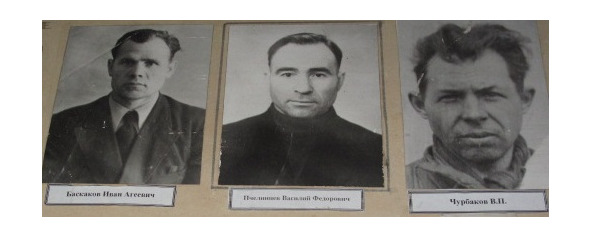
And the great country was finishing off fascism in his lair, began to think about establishing a peaceful life not only throughout the country but also in Neukuhren. In late April and early May 1945, five employees of the Soviet Fish Industry arrived in Koenigsberg to explore the possibility of creating and developing the fishing industry on the Baltic coast. Just two months after the artillery canonade, on the basis of the order of the People’s Commissioner of The Fish Industry of the USSR of June 14, 1945, No. 205, the Baltic State Fisheries Trust was established in Koenigsberg.
In February 1946, the Neukuhren Fish Processing Plant was established in the village of Neukuhren in the Koenigsberg region, subordinate to the Baltic State Fisheries Trust. It was located in the village of Lapinino (now the village of Fish). To get there, you need to climb to the high shore of the sea near the port of Pioneersk and pass in the direction of Svetlogorsk kilometer two.
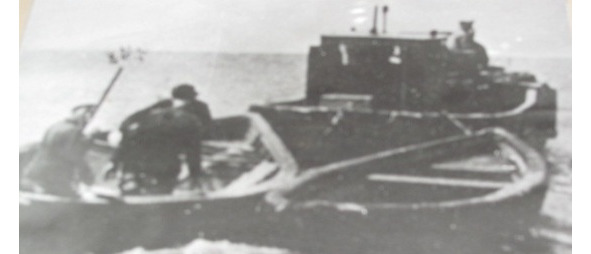
The first director was Vasily Stepanchenko. He was under his command of an accountant and calculation. On February 15, 1946, I.A. Baskakov, V.F., Pchelintsev, and V.P. Churbakov came from Moscow to the fishery with their families. The three of them were his first workers. The military obtained and brought two large boats to the port in tow. Fishing gear was found in Rauschen (Svetlogorsk). Sixteen people were hired from Rauschen. The first time from the put seine net, which was installed near the port, took 300 kg. cod. It was a great joy for everyone. Some of the fish had to be exchanged for the necessary products for the workers.
Sometimes the fish was sent to Koenigsberg. Ivan Baskakov was assigned the duties of a headman. At times, fishermen had to return to the port late at night. For the landmark instead of a lighthouse at the end of the eastern maul installed a barrel in which burned soaked rags. Caught fish was stored in a barn, in ordinary baths. Then they found a basement with a cement compartment. They salted and stored fish there.
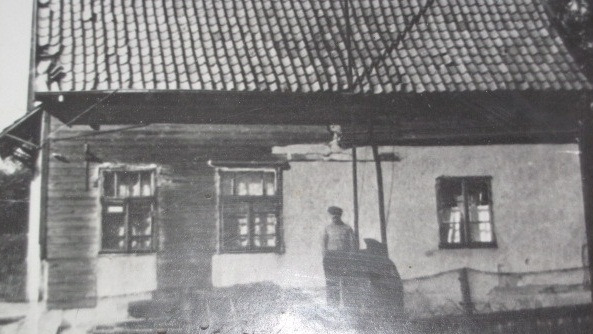
The boats were pulled ashore overnight. In the basement, there was a warehouse, where fish were taken from the pier on trolleys. In the same year, out of the Astrakhan fish farm “Astrakhanets” with six experienced fishers was seconded to the disposal of “Baltgosrybrest” Zimovin Pavel Andreevich (one of the first captains). In 1950, MRI “Snetok” (Captain Zimovin) won the prize in the All-Union Socialist competition. And in 1958, for his work, Captain Pavel Andreevich will be awarded the Order of Lenin. Now 32 people worked at the Neukuhren fish factory. At the head of this first fishing, the enterprise was director Yakov Goncharov. The whole plant is one apartment building, converted into an office. At the end of August 1946, the Neukuhren Fish Factory received five small fishing trawlers off the KFC type, Germany built. These were unsuitable
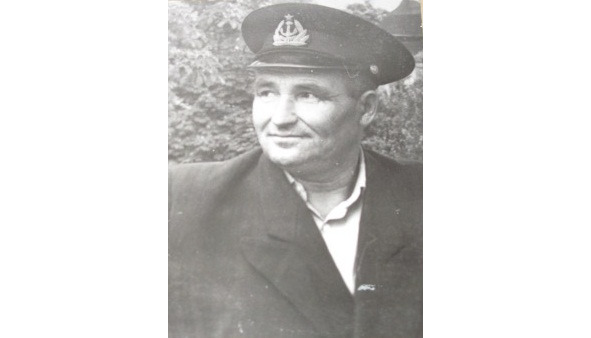
fishing vessels. The military trawled mines in the Baltic Sea. Then they handed them over to the fishery. There was no equipment on them. The fish caught was on the deck, there were no holds. From the stern were given trawls and all the fish was chosen by hand. Of the vehicles at the fishery, there was only one horse. Here I would like to bring the memories of the captain of the long-distance voyage Tatarinov Y.P., who began his sea life on the ships of our base. These of his memoirs are outlined in the book “The Fishermen’s Week, in Jest and seriously” edited by the writer-compiler, captain of the second rank, Associate Professor Baltic State Academy V.S. Emanov.
“In 1946 he started working on the KFC (military minesweeper). He worked for the Neukuhren Fish Factory. The crew of the KFC consisted of 5 people. Captain, assistant captain, mechanic, motorist, and sailor. KFC is a wooden vessel about 20 meters long, 4 meters wide, and 1.2 meters high. With winds of 4 marks, the KFC was not released from the port. The first low-power radio stations appeared only at the end of 1947. There were two cubicles on the ship. The bow cubicle housed the team, and the second cubicle was remade under the hold. The vessel had a 120 h.p. engine. Ship speed developed to 8 knots. It was not suitable for trawling. But still had to work and fish.
With the advent of 1947, the duration of fishing increased to 3 days. Then came a new MRT from Denmark, Finland, and Sweden. There were also well-known captains Volodin, Zimovin, Chechetkin Arkady Vasilyevich, Manakin N.Y., Zelenov, Azarenko. On March 15, 1948, he completed the course and returned to Pioneers. UTF at the time was headed by G.Y. Ermoshkin. But soon he was arrested, and he disappeared without a trace. On July 20, 1948, we were going fishing to the shores of Iceland. Along with the floating base, Tungus was an expedition. On the RS-4 “Wave” was a civilian captain Shprygin. The crew consisted of 17 people. We was been working for about three months. RS-4 caught 110 tons, and the smallest catch was 25 tons. When they returned to the port, the captains were calculated and sent to the military units, and the seiners began to prepare for distillation to the Caspian Sea and the Black Sea. Only the RS-5 remained in the UTF, where I was the captain, and Ilyin Georgiy Fydorovich was the chief. In 1950, after the Mamon training and course combine, I became the second navigator of the SRT-184 “Syryanin” where the captain was Fedor Sergeyevich Semyonov.” Historic — the archaeological museum “Rantava” of the city of Pioneers allowed me to publish some photos of pioneer fishermen of that time. Here they are.
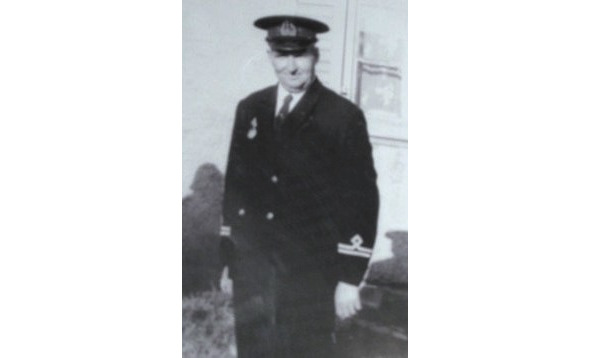
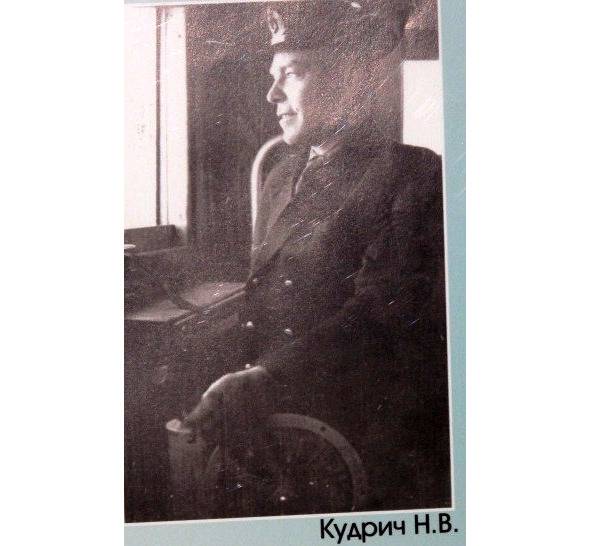
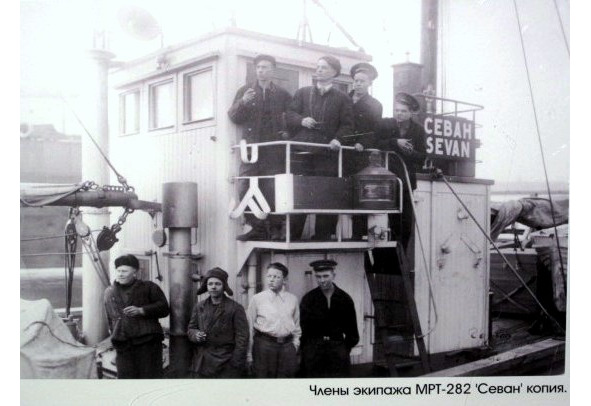
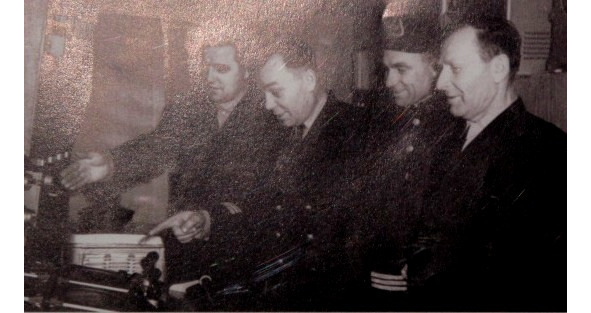
And in the photo below, four “sea wolves” cheerfully walk on the wooden flooring of the Pioneers pier. From left to right: captains V.M. Bykov, I.A. Savchuk, NI. Sizov, N.D. Ivchenko. Makeev Gennady was born in 1930. He graduated from Mamonov’s combine. In 1956 he became a senior mechanic. He sailed on many types of PBORF vessels. He went to the seas until 1987. His work experience is 45 years.
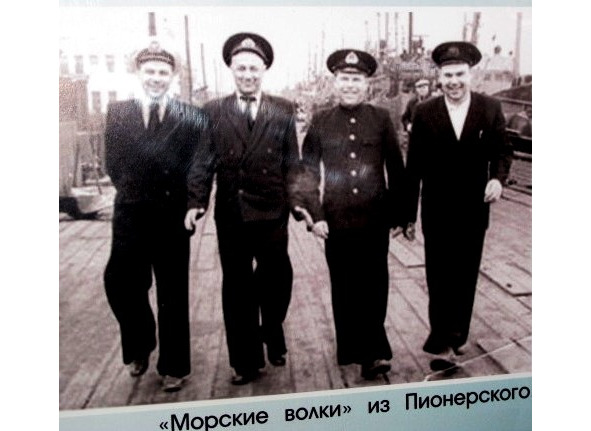
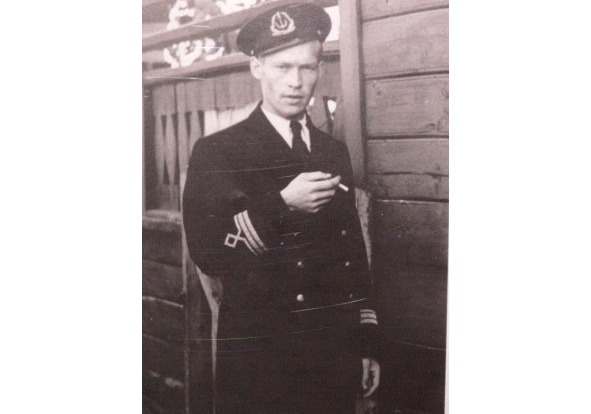
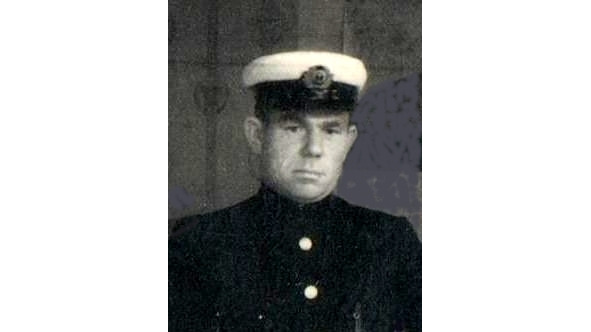
Memories of the captain of the long-distance voyage Tatarinov Y.P., about the famous captains of the base in early 1947, should be necessarily supplemented by the story of son Victor about his famous father — Captain Volodin Alexei Artyemevich. Victor was one of the first to read the electronic version of this book of the first edition and wrote me a letter. Here is it.
“Hello, dear Vyacheslav Fedorovich! I read on the internet your book “Remember this! Don’t let it sink into oblivion!” Strong, detailed, truthful, and useful to young people if they recognize the past.
Understanding the name of the work literally, I want to ask you, if possible, to supplement the material with information from 1946—1947 about the Knight of the Order of Glory of the 3rd degree, one of the pioneers of the Baltic, undeservedly forgotten captain of MRT “Fearless”, Volodin Alexei Artemyevich.
I mean the electronic version of your book. To keep the memory of the sailors, and “did not fall into oblivion,” please help “patch the gap” in the archive of the history of PBORF. Agree that without stories about the very first captains of the late 40s of the last century, the history of the base will not be quite real. I send you the surviving evidence of the modest merits of A. A. Volodin at that harsh time. I hope that we will be able, speaking in the sea language, to start a “patch” on the hole that happened at the Ship of Historic Memory of PBORF, which Captain A. Volodin gave the last thirty years of his life.
With a deep respect for you, Victor.”
Naturally, I immediately, having learned the address of Victor, sent him his copy of the book. And I received a reply of this content:
“Dear Vyacheslav Fedorovich! Received your wonderful book, why immensely happy and eternally grateful for such a gorgeous gift. To have a book about my small homeland, about the port and the city in which he was born and raised 70 years ago, is worth a lot. I think that if my father had seen it, I would certainly have supported me in this assessment. Thank you so much for creating it! Victor Volodin, Kolpino, Leningrad region.”
Agree that such a letter warms the soul of the author and makes more serious work on the material. That’s why I started with Victor to “plant a patch on the hole at the Ship of Historical Memory of PBORF”, which the Knight of the Order of Glory, the honored Captain Volodin Alexey Artemyevich gave the last thirty years of his life.
Victor sent a picture of his father. In 1939, Alexey Artemyevich graduated from the course of river-sea navigations in the city of Astrakhan. Until the war, he was walking across the Caspian Sea as an assistant captain on the Tobolsk fishing seiner. On June 27, 1941, he was drafted into the active army by the district military enlistment office in the village of Ukryanya.
1412 days and nights brought Victory closer in the mother — infantry ordinary machine gunner. He was wounded three times. The fourth year of the war ended on the Kurland Peninsula in the 8th separate Guards Mitava Liaison Battalion of the First Rifle Corps. He was awarded the Order of Glory of the 3rd degree and the Medal for Victory over Germany. After the war, he was recruited to the Koenigsberg region. On April 27, 1946 (as recorded in the workbook) Alexei Volodin was hired in the Neukuhrevsky Fish Factory as captain of a motorcycle boat. As soon as other minesweepers were received, he was appointed for an MRT — “Fearless”, onboard which was committed a lot of labor feats, which, perhaps, you will not remember. In 1947, Alexey Artemyevich was nominated by the base’s workers and Pioneersk residents as deputies of the Kaliningrad Regional Council of Deputies.
Here is a preserved view of the candidate Volodin.
Volodin
Aleksey Artemyevich
Candidate for deputies of the Kaliningrad Regional Council of Workers’ Deputies
for Pioneer constituency No. 63.
The famous fisherman Alexey Artemyevich Volodin was born in 1914 in the village of Karalat, Kamyzyak district, Astrakhan region, in the family of a fisherman. As a 13-year-old boy, he began working as a fisherman in the fishing collective “Memory of Kuibyshev” in his homeland. Since then, he has not parted with his profession.
In 1939 he was appointed captain on the ship of the fishing collective “Memory of Kuibyshev” and then as captain of the sea fishing in the city of Astrakhan, where he worked until the summer of 1941. During the Great Patriotic War, Alexey Artemyevich was in the ranks of the active Army. He participated in the liberation of Donbas, the Crimean Peninsula, the Baltic republics. Awarded the “Order of Glory” of the Third Class and the “Medal for Victory over Germany”.
In 1946 he enlisted in the Baltgosrybtrest and was appointed to Pioneer fishery as captain of the “Fearless” fish trawler. Under his leadership, the trawler’s team fulfilled the annual plan by October 8. Participating in the All-Union Socialist Competition, the team for work in the second quarter received a monetary prize and a rolling pennant of the ministry.
Now Captain A.A. Volodin and his team are fighting for the implementation of the second annual plan by November 7, 1947. A non-partisan Bolshevik, who fervently loves his homeland, Alexey Volodin is registered as a candidate for deputies of the Kaliningrad Regional Council of Workers’ Deputies in Рioneer constituency No. 63
And this is the order No.121 of August 26, 1947 for the Baltic State Fisheries Trust. He celebrates and encourages the editorials of the All-Union Social Competition in the second quarter of 1947.
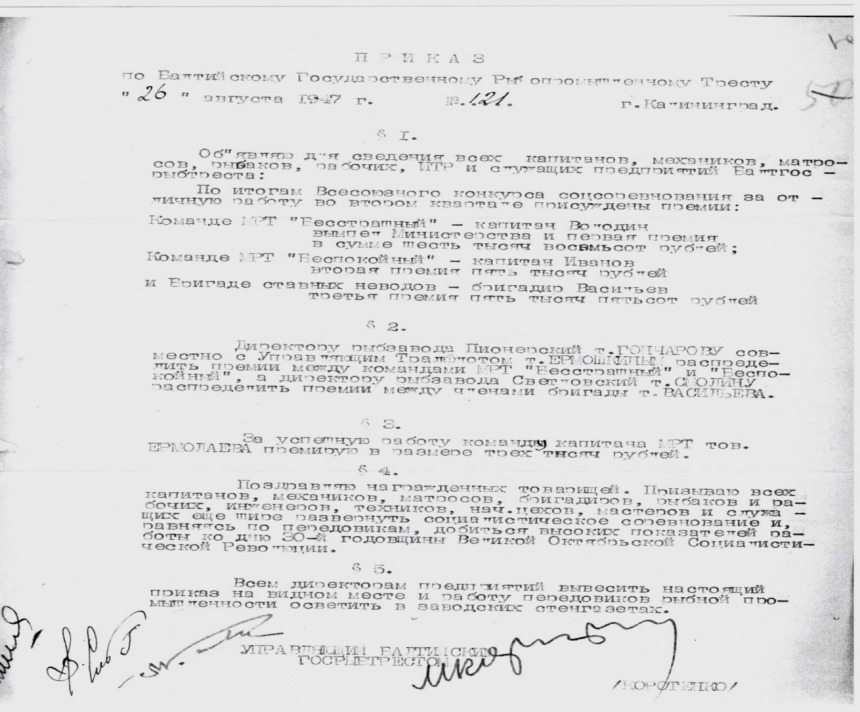
“1”
I announce for the information of all captains, mechanics, sailors, fishermen, ITR, and employees of the Enterprises of The Baltgosrybtrest: As a result of the All-Union Competition competition for excellent work in the second quarter Prizes were awarded:
The team of MRT “Fearless” — Captain Volodin, pennant of the Ministry and the first prize in the amount of six thousand eight hundred rubles;
The team of MRT “Restless” — Captain Ivanov, the second prize, five thousand rubles and
a brigade to put of seine-nets — Brigadier Vasilyev, the third prize, five thousand five hundred Rubles.
“2”
The director of the Pioneersk fishery, T. Goncharov, together with Governor Tralflot T. Yermoshkin, distributed the prizes between the teams “Fearless” and “Restless”, and the director of the fishery Svetlovskiy T. Smolin to distribute the prizes among the members of the brigadier Vasilev.
“3”
For the successful work of the team captain Yermolayev a pre-peace of three thousand rubles.
“4”
Congrats to the award-winning comrades. I call on all captains, mechanics, sailors, brigadiers, fishermen and workers, engineers, technicians, shop heads, craftsmen and employees to expand the socialist competition even more widely and, equal to the editorials, to achieve high performance of the co 30th anniversary of the Great October Socialist Revolution.
“5”
All directors of enterprises to put this order in a prominent place and the work of the editorial industry to illuminate in the factory wall newspapers.
Manager of the Baltic State Trust (signature) /Korotenko/
In 1953, Captain Volodin Aleksey Artemyevich was included in the book of honor.
The testimony remains. Here is it.
For the high production performance achieved in the socialist competition. Volodin Aleksey Artemyevich was put down to the Book of Honor of the Baltgosrybtrest and the Trade Union Committee on December 30, 1953.
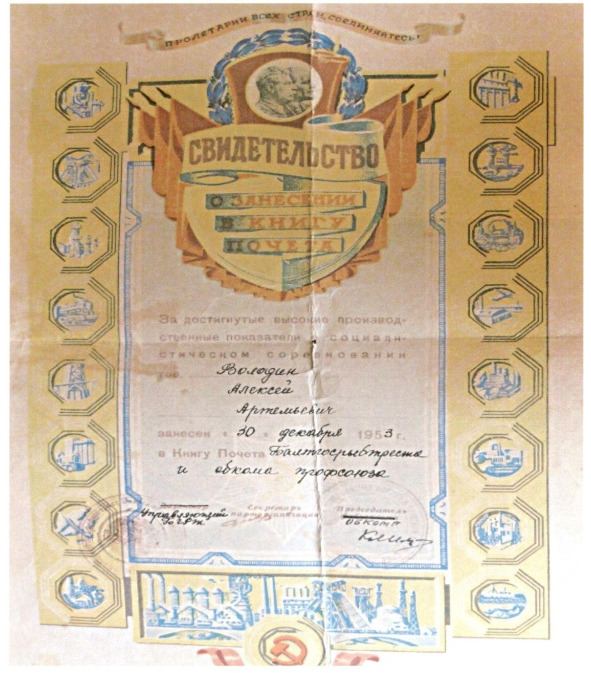
According to Victor’s son, the veteran of war, a Chevalier of the “Order of Glory” and a medal for “Victory over Germany”, even before the war was closely associated with the fishing industry of the Soviet Union. He fed the country with fish, working on fishing vessels of the Caspian basin. But as soon as the terrible hour came for the country, he joined the ranks of the defenders of the Fatherland. A simple machine gunman went through the whole war.
He was wounded three times, but always returned to the front line. In the spring of 1946, having removed the military gymnast, he returned to the front line. Now it’s a worldtime front. The victorious Great Country needed food. And Alexey Artemyevich went to sea again. But it was a different pool. The Baltic Sea lovingly received a professional fisherman. They understood each other. But severe military wounds undermined health.
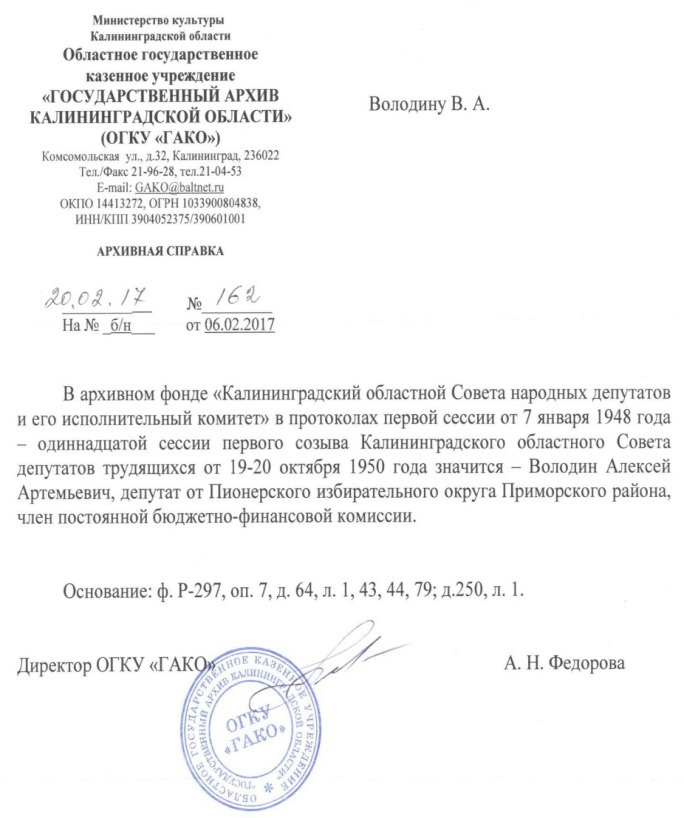
It says:
In the archive fund “Kalingrad Regional Council of People’s Deputies and its Executive Committee” in the minutes of the first session of January 7, 1948 — the eleventh session of the first convocation of the Kaliningrad Regional Council of Workers’ Deputies October 19—20, 1950 is Volodin Aleksey Artemyevich, a deputy from the Pioneers constituency of the Primorsky district and a member of the permanent budget and financial commission.
And below you’ll read his memories of his father. I bring it in its entirety, preserving the author’s style.
“Early left without a father, Alexey 13-year-old learned various methods of fishing in strange farm, and simply farm labourered. It’s a good thing he was strong born. I had to survive somehow, helping Maria’s mother. With the formation of fishing collective farms, he settled in the artel, where along with experienced catchers mastered the collective extraction of live silver on rivers, currents and in the Volga Delta. In society, his efforts to fish, strong hands, knowledge of feeding and spawning of fish, the ability to navigate the river, appreciated, and entrusted to the smart young man to manage the barge. Since then, Alexei, a 14-year-old capten, they began to respectfully magnify Artemych.
In the future, he said, everything was more or less successful. He’s firmly on his feet. There was prosperity in the house. Then they did not think to pay for the work of fishermen with work-days — chopsticks. He’ll be the one to try later when he gets back from the army. And soon the time came to marry, and in the bride Alexey chose the simplest girl Klava, the daughter of Arkhipov Mikhail Fedorovich. Looking ahead, I can say that my parents lived together for 42 years, until the last day of our father. They raised four children, although there could have been more if not for the disease. And they had everything in common, as in people.
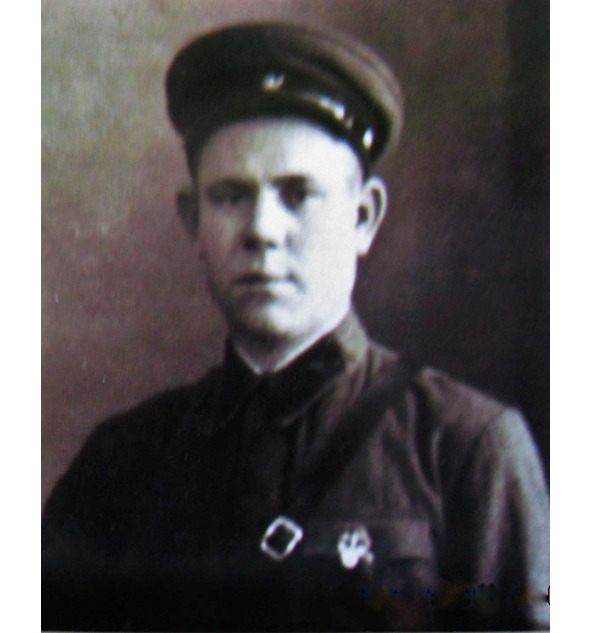
In 1935, Volodin was born his first child — our older brother Michael. And the next year my father was called up for urgent military service. He served in the city of Leningrad. Demobilized, he already knew firmly that he would devote himself to the fishing fleet. Whether there was a share of romance, I do not know, but the day after returning from the army, my father took the documents to Astrakhan College for courses in ship navigation, there just ended the reception. It was accepted without unnecessary talk, and the next 1939 it was made of a river peasant- catcher, a shipmaster of ships of the type river-sea. Unfortunately, the document has not been preserved.
Returning from studying at the fish farm “Memory of Kuibyshev” father for a long time could not apply the knowledge in practice: there was no fleet in the collective farm and did not allow to leave. And only with grief in half, literally, after the death of five-month-old son Vitaly, Alexey Artemyevich was released on “free bread.” And a couple of days later, on July 8, 1940, Alexei Volodin was hired by the “Morlov” Volgo-Caspian Trust helmsman. In this position, on the Seiner “Tobolsk”, he began to get acquainted with the Caspian sea on a real ship. After the first trip, Alexei Volodin was appointed assistant captain, and again, as before the army, everybody began to call Artemych gratefully…
However, this benevolent idyll did not last long. The famous events of June 22, 1941, which broke the fate of millions of Soviet people, did not bypass the Volodin family… Aleksey Artemyevich was summoned to the RVC on the fourth day of the war. My mother said that she would remember this black Thursday, June 26, 1941, forever. The day when life was instantly divided into “before and after.” And between them the unknown at the age of four?.. My father was lucky, he returned from the war. Wounded, with a tormented soul and body, but alive.
I do not know, of course, as other front-line soldiers, but our father did not like to remember the war, although for sure he had something to tell the boy. Three wounds, the first near the Northern Donets, near the Ukrainian village of Krestish, the most severe, in the chest. The next year, in the foot, in the Donbass. Forcing Sivash in 1943 and third wound in 1944 at the liberation of Simferopol. The encirclement near the town of Tucums in Latvia. First meeting with the Baltic Sea. And finally, Victory!
The soldier came from the front in the deep autumn of 1945. The village of Karabat quieted down, as if there was no one in it. Not all defenders of the Fatherland returned home. In Volodin’s hut, “a ball of kati” (from old, saying). On the threshold children small, wife, yes mother her old lady. We met the owner, who defeated fascist Germany, boiled potatoes in a uniform from the garden, and the soldier’s daily ration and fed up. And when the tears of joy at all dried up and together gathered to build a new peaceful life of a full-fledged peasant family.
In this regard, Aleksey Artemyevich had to go to the city of Astrakhan, to correct the documents, as they said then. There and there was a fateful meeting with a man from the city of Koenigsberg, who turned the life of the Volodin family into a bright future. Talked. Sergey Golovkov turned out to be a recruiter from Baltgosrybtrest, came to recruit sailors to work. Learning that in front of him the captain of the fishing boat, he, like a tick, clung to his father and began to persuade him to move.
Alexey Artemyevich listened to the walker, asked a few questions for order and almost agreed, promising to consult his wife. The recruiter, in turn, gave two months to think, appointed a day, wrote some piece of paper, perhaps with the address of the collection point and took his father’s honest word. That’s what we parted with…
Volodin arrived in the Baltic in late February — early March. In the trust of the father was sent to the village of Neukuhren, which was later renamed the city of Pionersk. At first they lived in the village of Lippainen (German, I remember it as Lapinino), there survived a lot of buildings. Later the family was moved to the street Dachnaj…
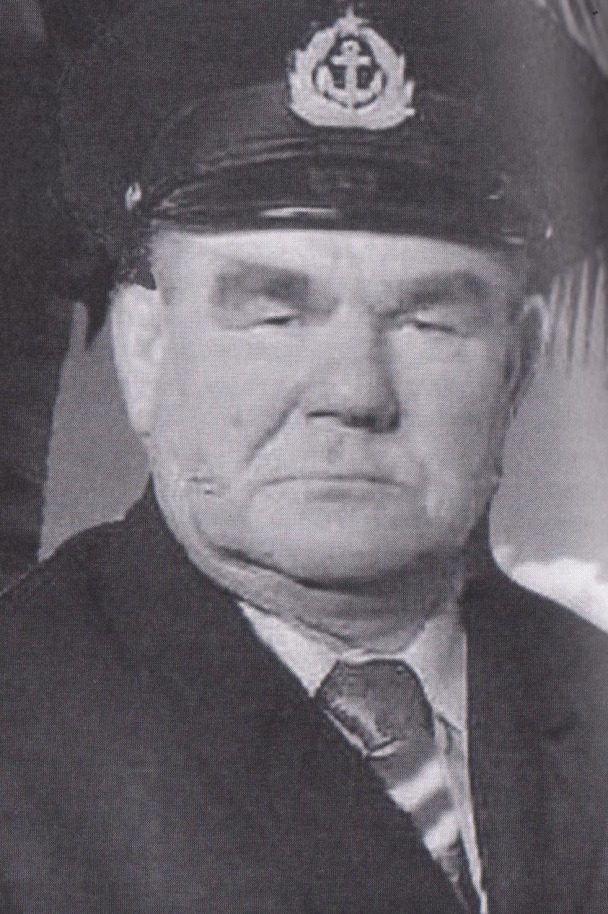
On April 27, 1946, Alexey Volodin was hired by the Neukuhrensky Fish Factory as captain of a motorcycle boat. A little later, several small vessels (MRT) were received, which, even with minimal equipment, proved to be positive.
In each voyage Captain Volodin came out confidently and calmly. He had no fear of the unfamiliar Baltic. He left it forever on the steep slopes of the Northern Donets, in his first combat attack, in 1942, on trench the enemy. Since then, where there once were feelings of doubt, now lived reason, knowledge, solid calculation and natural savvy. Only on these, so-called whales sprouts and matures professional experience — argued Alexey Artemyevich.
— Captain! — My father liked to speak — Mind, Honor and Conscience of the ship, even as small as an MRT. For conscientious work Captain Volodin A.A. with his team of sailors was repeatedly award a prize and encouraged by cash payments.
In December 1947 he was elected a deputy of the Local Councils. In December 1953, the name of Captain Aleksey Artemyevich Volodin was included in the book of Honor of the Baltgosrybtrest and the trade union committee. In 1958, The Motherland added a medal “For Labor Valor” to the combat awards of a WWAR participant.
In the mid-sixties, the military wounds had an impact on the health of captain Volodin and the medical commission closed his way out to sea, but allowed him to work in the port. Alexey Artemyevich finished his career in May 1975 as senior assistant captain in the port tug RBT-13.
On September 19, 1976, after a long illness, the veteran of the Great Patriotic War, Captain Volodin Aleksey Artemyevich passed away. Eternal memory to the pioneers and founders of the PBORF fishing industry in Pionersk, Kaliningrad region, who made their way to the world’s oceans.”
On September 1, 1946, a primary school was opened in the village of Neukuhren. Schoolchildren gathered about 100 people. She was located in a small German house. And in 1947 she became a seven-year school. Then, in 1958, a new school was built, designed for 700 students. In 2007, a new modern secondary school was opened on Fleet Street. But by the end of 2018, this school is no longer able to accept the growing generation of the city Pioneersk.
In the autumn of 1946, Yuri Fomenko, Devyaterikov, Klimov, and Ionkin were also sent from Astrakhan to the base. All of them subsequently went to sea by captains and had excellent production figures.
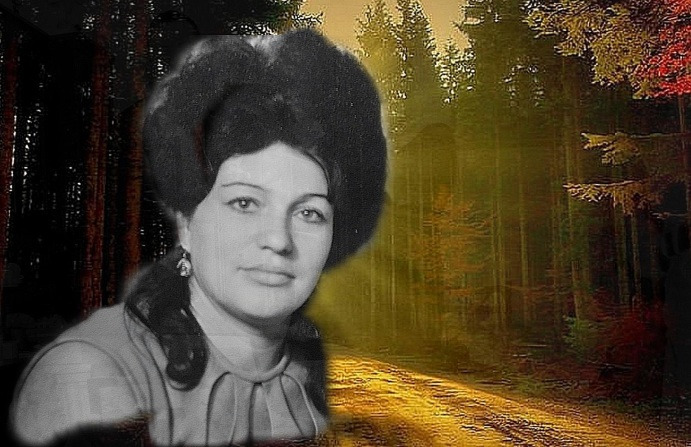
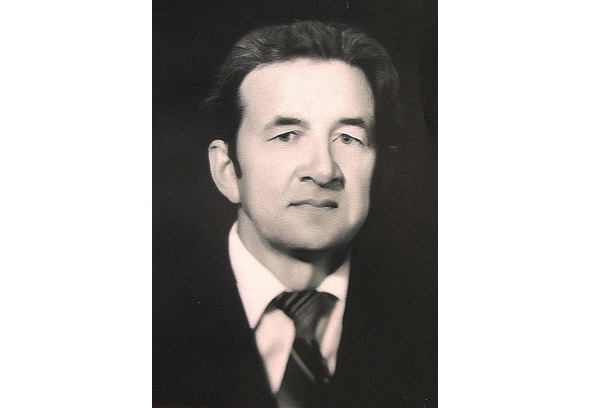
Yuri Fomenko then began to work as an inspector, was the chief captain. He was highly respected among the fishers. A long illness soon prevented him from going out to sea. His wife, Lyubov Ivanovna as a medic, supported him in every possible way. In 2012, Yuri Ivanovich died.
Lyubov Ivanovna Fomenko (Gavrashenko) was born in Kherson, graduated from Kherson cult pro-enlightenment school. In 1971 she graduated from Kaliningrad Medical School with a red diploma. At Pioneers Hospital she worked in the maternity ward. Then she went to work in the Pioneers Base in the department of DEA (the deratization of ships, epidemics, and contagious diseases). She supplied medicines for the ship’s first aid kits, instructed the captain’s senior assistants, and carried out the deratization and disinfection of ships.
They raised two sons, Alexander and Yuri. Yuri Yuryevich, a lieutenant colonel, already retired, lives in Astrakhan. Alexander Yuryevich was born in 1963, graduated from the Kvmu named Frunze, served in the Navy. In the rank of captain of the 2nd rank in the reduction of
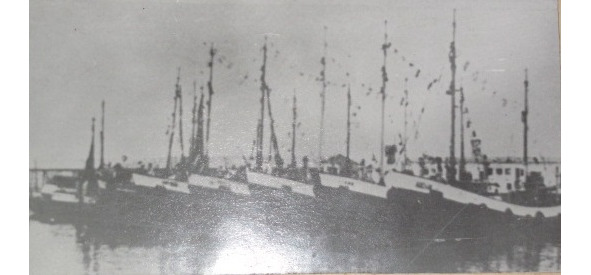
staff, he left the Navy, received his second higher education and since 1990 began to work in the base. In November 1998, he was elected CEO of Zapmorphlot LLC. The company has two TSM-class fishing vessels. The company’s products are well known to customers from Canada, Japan, China and Denmark.
In July 1947, the Neukuhren Fish Factory became the Pioneersk Fish Factory. In August 1947, on the orders of the Baltic State Fisheries Trust for No. 114, the trawling fleet management (UTF) was organized as an independent economic settlement enterprise in the Pioneersk region of Kaliningrad. G.Y. Ermoshkin was approved as the chief.
In the severe weather conditions of the Baltic, in January- February 1948, the captain of the MRT-50 Peter Yermolayev took on a voyage to the Baltic only those who expressed a desire. Fortune was favourable daredevils. The catch was about five tons. With great difficulty managed to pick up the catch and trawl on board, not having any devices on the ship. So many fish rarely mined. In early June, the crew of MRT-33 “Terrible” Captain Zimovin P.A. extracted 240 tons. This made up the annual plan.
The ships continued to arrive. The total capacity of the fleet was 9,000 horsepower. Fish production increased to 3060 tons. We caught mainly cod, flounder, sprat. In the same year, a 150-metre-long wooden pier and a new fishery building, which was located on the beach, were built. Production at the plant was 457,5 tons, and all products were sold at 1641.6 thousand rubles.
In 1948, construction began on the fish port, which was the second largest in the region. To improve the range of manufactured products built a shop by smoking. In June 1948, Konstantin Sobolev, an experienced fishing captain from Murmansk, who served in this position until 1952, was appointed head of the UTF. The chief engineer was Vasily Albanov.
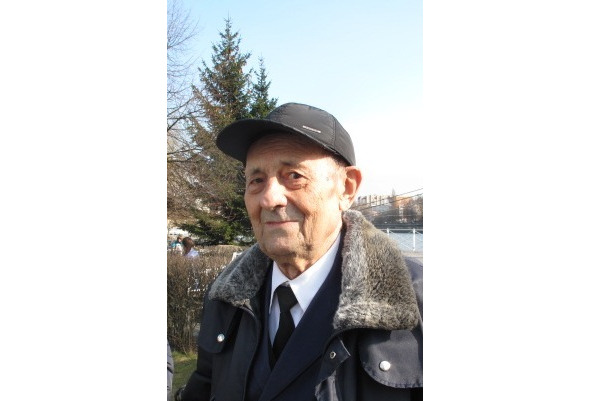
In the winter of 1949, for the first time captains P.A. Zimovin, P.L. Yermolayev, A.I. Ivanov went to the central part of the Baltic. In the area of the island of Gotland, they started fishing cod. Captains Pavel Bilyak and Grigory Glukhov are included in the regional Book of Honor of the winners of the socialist competition. Also noted are the mechanics Pavel Markianov, Ivan Britikov, Mikhail Venin.
In the same year, a 19-year-old boy was hired as a sailor on MRT-262 “Octopus” Dmitry Vasilyevich Ershov, born in 1930. That’s foto his at the end of March 2016. It is still strong and serves as an example of resilience and love for life. Since 1970 he worked as a mechanic and senior mechanic on the ships of the base. He has been awarded many medals for his work. I want to bring his memories of those times. He wrote an article on my blog, “The give birth of our fish industry.” I bring it completely, observing the style of the author.
“As pioneersk fishermens helped to fill the warehouses of the native land. I have a special date this year. 65 years ago, in 1949, I joined the fishing fleet. Namely — to the Office of the Trawl Fleet, which was in Pioneersk. A 19-year-old boy, I got a job as a sailor on an MRT-262 Octopus. And for many years after that I lived with the ship’s residence permit. Lived like a snail — my house was where the ship was. The formation of the region and the Kaliningrad fishing fleet took place before my eyes. During this time I have studied the history of the region’s fish industry well, taking a direct part in its work.
Along the way he studied — in Mamonovsky UCC (training and course combine), in ShukKPS (school of improvement of personnel of the command boat), in the maritime school.
But a special place in my destiny is occupied by the city of Pioneersk — former Neukuhren.
.. On April 14, 1945, units of the Red Army took possession of Neukuhren. The local port was then two powerful mauls — northern and eastern. There was also a small wooden pier in the southeastern part of the water area. In the northwest part was stranded with numerous boulders. Construction of the port began in 1902. But it was never completed. The war-torn country was in dire need of food. And the fish was supposed to be a powerful help here. On June 14, 1945, an order was issued by Narkomrybprom on the formation of the Baltgosrybtrest. And in July, forty-sixth, our fish factory was being created at an old German fish processing plant a couple of kilometres west of Wanger Bay in Neukuhren. And soon the first catch was brought to Koenigsberg, just renamed Kaliningrad.
Delivery of fish to Tchaikovsky Street, 49—51, where the trust was managed, was entrusted to Ivan Baskakov, a member of the war, a lieutenant. Subsequently, Ivan Ageevich became a senior mechanic of SRT-4294 (in 1957 I was his third mechanic). On July 26, 1947 Neukuhren was renamed Pioneersk. And on September 1 of the same year, UTF was created (Office of the Trawl Fleet), which is located in the house No. 1 on the street of the Embankment. Thus, Neukuhren-Pioneersk became a kind of maternity home of the fishing industry of the Kaliningrad region.
Most of the specialists among the first fishermen came from the ranks of the army and navy. Thus, in 1949, the chief engineer of UTF was the captain of the 2nd rank of Patrakeev, and the group mechanic — Senior 2 articles Daniluk (graduating in 1941 Odessa Maritime School). Deputy head of Belokurov, head of human resources Anufrievsky, captains Chechetkin, Novostavsky, Glukhov, Zabenin, Polonsky, Zimovin, Pukinsky, Medvedev — all transferred from the military. Our fishing fleet consisted then mainly of wooden vessels of the type KFC and boats, most of which did not even have radio stations.
This problem was solved by stations removed from aircraft. In Pioneersk then, in particular, the base of torpedo carriers of the Baltic Fleet was stationed. Sometimes, along with radio stations, radio telegraph players came to us. All in the same so memorable for me 1949, in October, began to come vessels such as MRT of the Finnish building (in the account of reparations). At that time — excellent sea vessels onboard trawling for coastal fishing. In 1950 Konstantin Andreevich Sobolev was appointed head of the UTF. At the same time began the construction of piers and cleaning of the water area of the port from the boulders, which here and there were sticking out of the water.
I can’t help but mention the incident that occurred in the spring of 1951.
In that spring appeal, the district military enlistment office of the city suddenly sent summonses to half of the workers of the fleet. They were young fishermen, like me, who had a residence permit on the ship. If they had all been called then, the fishing would have been disrupted. Because of the incompleteship of ship crews. Sobolev, having learned about it, flew to Moscow on an emergency military plane directly from Pioneersk. And there he appeared in the Central Committee of the party with a request for help. Returning the next day early in the morning, Sobolev came to the military enlistment office and, making his way among the slumbering conscripts from Pioneersk (slept on the floor, waiting to be sent to the troops), went to the office of the military enlistment office. And twenty minutes later he came out of there and said:
— “Which of the trawling fleet must lift up! The bus is waiting on the street. Go back to your ships immediately. And in the sea — to catch fish.
Sobolev is from Archagelsk, a hereditary fisherman. He was demanding and harsh.
For example, once he had to “educate” two of our captains. N. and G. went for a walk. As a result, two ships could not go out to sea. Sobolev summoned them to his cabinet, closed the door. And when he came to G., who was closer, he suddenly hit him so hard that he flew across the table. N., seeing this, jumped out the open window. Needless to say, soon both of the captains walked out into the sea.
In 1951, the Fishermen’s Culture House opened in Pioneers. In 1952, four SRTs left our port into the Atlantic. In 1959, a tuna expedition to the Central-East Atlantic was organized by two vessels of pioneering UTF — SRTR “Oskol” and “Orehovo” under the leadership of Dolgov and Kadilnikov. It was possible to open a tuna fishing area. It was a great success.
And in 1963, UTF was renamed the Pioneers Base of the Ocean Fishing Fleet. PBORF already had an impressive fishing fleet, which included vessels of various types: SRT, SRTR, SRTM, SRTMK. The port had mooring lines of 725 meters with powerful equipment for unloading and loading work and a good repair base. STR, STM, and even tropic-type vessels began to arrive. PBORF played a prominent role in the region’s economy. And Pioneers budget was 70 percent formed by the contributions of the fishing industry. But, alas, in the 90s came a black streak for the region’s fisheries industry as a whole, and for PBORF. As a result, today we have almost no fishing fleet, and our specialists work on foreign vessels. Shame. And there’s nothing you can see about the end of this black stripe.
Now the Pioneersk port near the entrance part is shallow, currents and storms bring it sand. The depth at the entrance is already only two and a half meters. Cleaning is needed, and finances are not allowed to do so. There were a lot of plans in this regard, but all of them were so on paper and remained…
I lived in Pioneer for a long time. On the street of the Embankment, house number 4, which is on the very shore. I worked at the Pioneersk UTF, then in PBORF. My children were born in this city. The eldest son, having graduated from KVIMU, thirty years went to the seas, having gone from sailor to captain on heavy-duty ships. Unfortunately, he often went to foreign courts. Now he works in the port administration. My grandson followed in my footsteps, too. He graduated from the BGA, now works as a senior assistant captain on gas vessels. However, also foreign…
I, a former mechanic and founder of our ershov sea dynasty, am proud of what happened. But nostalgia is tormented. Oh, that nostalgia!..
From the glorious past we, the old fishermen, were left with only memories yes Holiday — Fisherman’s Day..
.And yet I want to believe that the Kaliningrad fish industry will be revived. And Pioneersk town will regain the former glory of the fishing city.”
The MRT (small fishing trawler) of finnish construction had the following data: length — 23.6 meters, width — 6.5 meters, precipitation in cargo — 2.74 meters. Water displacement — 162 tons. The payload capacity is 30 tons. Swimming autonomy — 10 days. Engine power — 200 hp. Trawl winch — traction force — 2.0 tons. Speed: 9 knots. There are 11 beds.
In mid-May 1950, the crew of the trawler “Zutis” (Captain Aleksey Kucherenko) for the first time in the UTF went on a long voyage to the Baltic (fifteen days). Fifty tons were caught. At a rally on the occasion of the arrival at the port, Alexey Kucherenko said: “This voyage we proved that on our small fishing trawler not only it is possible to go out hundreds of miles from the shore, but also to carry out continuous fishing for 15—20 days.”
The same idea was expressed a little later, sending the first herring expedition to the Atlantic, the Minister of Fisheries Industry of the USSR A. A. Ishkov. He said: “Your first voyage is reconnaissance, experimental. It will be difficult in every way. There will be difficulties in the development of the area new for the Soviet fishing industry and in the operation of new ships, fishing gear, machinery and equipment. There will be difficulties associated with the fact that among the participants of the expedition there are many newcomers who are not only unfamiliar with the sea, but also for the first time will get acquainted with the sea.”
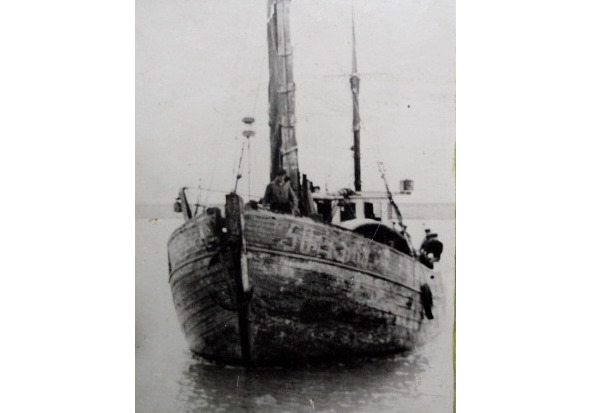
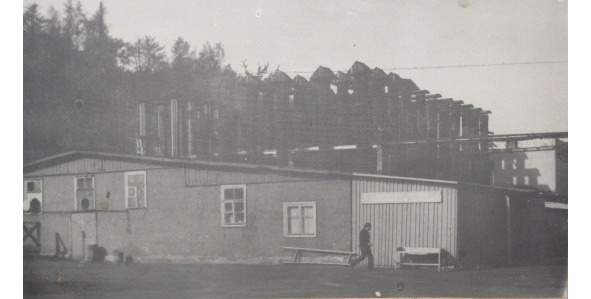
There were already 46 vessels in the UTF. The newspaper Kaliningrad Pravda wrote in October 1948: “… a large socialist industry is being created in the place of small artisanal fisheries.” It’s all true. But in fairness it is necessary to say about those difficult living conditions and work of fishermen in those hungry post-war years in the village of Pioneersk.
In 1947, Belov Ivan Antonovich was the secretary of the party bureau of the party organization. He was born in 1903, a secondary education, a member of the Communist Party since August 1937. He was later awarded the Medal for Valiant Work. And in the spring of 1949, having been approved by the 8th session of the Pioneersk Village Council of Workers, Chairman of the Council of Belov Ivan Antonovich assume a documents from the former Chairman of the Executive Committee of the Pioneersk Village Council of Labour Deputies since 1947 Alexandre Filimonikhina.
In their acceptance and surrender act of March 31, 1949, in the section “Housing and Utilities” read: “On the balance of housing and utilities of the Village Council there are 75 houses with a residential area of 8000 square meters. and a useful area of 750 square meters. employed for warehouses and retail outlets (shops, diners, teahouses). The state of the housing stock 80% requires an average repair and 20% requires an overhaul.…
The Pioneersk village has a 15-bed hospital with a maternity ward that is closed due to lack of food. Incomplete secondary school, which does not meet sanitary standards and is under-provided with equipment and inventory. Library in the number of books 1790 copies. The room requires repairs and crafts racks to accommodate books. Accepted tables of different 5, chairs hard — 2, reed chairs — 2, one stamp of the executive committee of the Pioneersk Village Council of Workers’ Deputies.
As of March 31, 1949, the village is not landscaped, the village does not have a public bath, there is a bath of fish factory, which is not equipped and does not meet sanitary requirements, the streets of the village are dirty and not illuminated, in the yards a lot of garbage, sewage, There are no public latrines and garbage bins, sewerage in the majority does not work, requires major repairs. The village in which most houses have no electricity, wiring in the houses is to be replaced and equipped. According to technical rules.
Chairman Pos. Council gave out / Philimonikhin /
Accepted by Chairman Pos. Council / Belov/
Spelling of the original preserved.”
Communist Belov, taking from Filimonikhin village in such a state understood how difficult it is for him to work. After all, there is not a penny in the budget of the village. What could have helped the management of the trawling fleet. But it was just beginning to get back on its feet and strengthen its economic position. It will then become a city-forming enterprise and will provide significant economic assistance not to the village, but to the city of Pioneersk. And despite all the difficulties, pioneersk fishermen continued to go out to sea. And even for a long time at that time (15 days) worked in the Baltic. Soon they were went on a herring expedition to Iceland together with the swimming base Tungus.
And the wives of fishermen gave birth to beautiful children in the maternity hospital in the city Cranz (German). There was no such opportunity in Pioneersk then. My mother-in-law lived in Georgienswald and gave birth in Cranz (German). And to see the light for my wife helped a midwife — a German. For that I am very grateful to her. It was at the end of June 1947.
On one of the hottest days of June 1947, the village of Neukuhren hosted another large family of migrants from the city of Krasnodar, Khoroshavina Nikolai Andreevich. As all this happened, I kindly reminded his daughter — Tamara Nikolaevna. This is a photo, that my camera left behind on March 12, 2019.
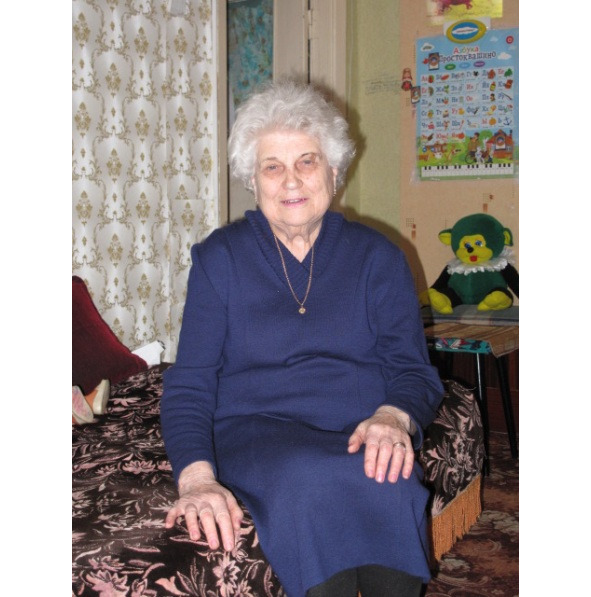
Tamara has a good memory in her years. At home, she unmistakably calls for me the many names of captains and senior mechanics of the Pioneer Base of the Ocean Fishing Fleet. And this is not surprising. After all, she is the daughter of a famous captain. And this obliges to a lot. On four sheets of clean handwriting, she prepared for me the story of a beautiful family of a migrant — Khoroshavin Nikolai Andreevich. And I, without correcting almost anything, pass this story on to you, dear reader.
Nikolai Khoroshavin was born on November 29, 1913, in the village of Tara in the Omsk region. In 1939, Yakutia was called immediately to the front, when there was a war with the Finns. He was awarded the Order of the Red Star for his courage and bravery. In 1941 he left Krasnodar for the front of the Great Patriotic War. Defended the North Caucasus. He was also awarded medals. After the war, he returned to Krasnodar.
Soon Khoroshavin decided to enlist in the post-war Koenigsberg — the city of Kaliningrad. In the summer of 1947, he, his mother — Anna Vasilyevna, his wife — Evdokiy Pavlovna, and their three children arrived in the former Neukuhren — the village of Pioneers. Anna Vasilyevna began to work as a watchman of the smoking shop of the UTF fish factory. Evdokiy Pavlovna with her three children was a housewife. Their eldest daughter Tamara was born on May 11, 1936, the older brother Boris was born on September 18, 1938, the younger brother Nicholas was born on June 11, 1940.
On arrival in Kaliningrad, we were placed in the basement of a large red house on the square. There were a lot of migrants. The next day, Dad brought the whole family to Pioneers, to the UTF office. Captain Medvedev took us to his home in Lapineno, where we spent the night. The other night we spent on Komsomolskaya Street, where the house of the mode of life is now located. The next night we spent the night on the Railroad street 22, where Dad was given two rooms. There was no floor in one room and the window was not glazed. Dad laid this window with bricks. Grandmother Anna Vasilyevna began to work as a watchman of the smoke shop, which was located at the railway station of the village of Pioneers. She worked until 1949. Dad went to work at the port.
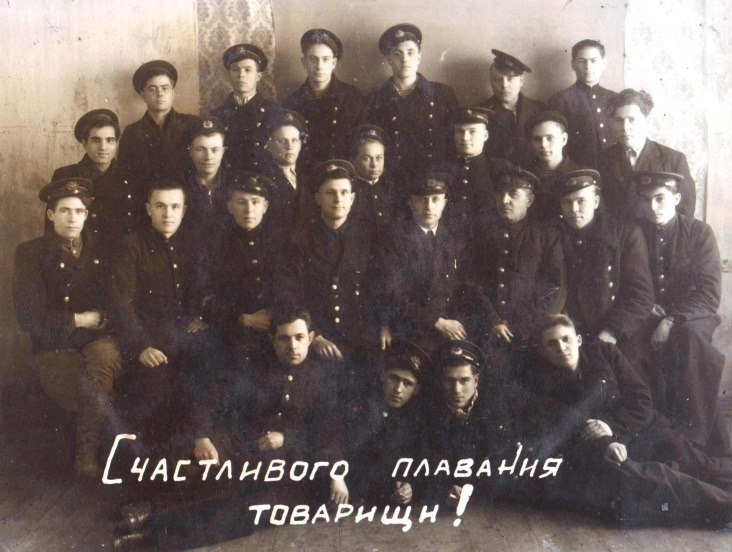
He began to walk in the sea on KFC — 16 sailors. Then they went to the sea for three days. I used to meet my dad from the sea. In winter, the ship was often covered with ice. There was an open-air fish factory in the port. I remember, as my dad brought me on a boat, gave me paper and a pencil to draw. He put me in a navigator’s cabin so I wouldn’t go anywhere. And he went downstairs to unload the fish from the hold. Then I heard his voice. He was shouting at someone.
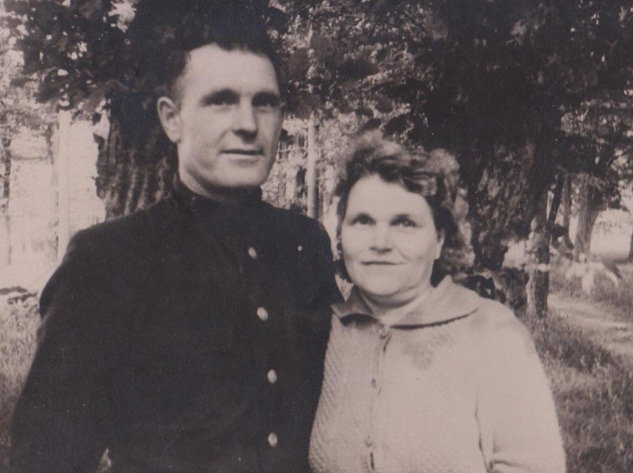
I’ve always heard, “Faith, faith.” When I got home, I told my mother how my father shouted, “Faith, faith.” My mother asked my dad what Faith he was calling all the time. Dad laughed and said that “faith” is not a girl Vera, but a “vira” that means up. This word is used by all sailors.
Soon my father was sent to study at Mamonov “academy” as it was called at that time. In 1949, navigators for the fishing fleet were produced. And Dad started walking as an assistant captain. In this photo, my father and mother when Dad became the captain’s assistant. At one time he was an assistant captain at Chechetkin Arkady Vasilyevich. They had Markov Ilya as a mechanic. The Markovs lived above our apartment at 22 Railroad Street. I knew his wife, Douro, and his daughter Galya. Captain Dad began to work on MRT-256. They had a mechanic for Chehotkin Yuri. They then fought for the Passing Red Banner.
Once it was raining heavily, and I saw a picture of Dad on the board of honor. It was attached by buttons. I took it off and brought it home. My mom told me I shouldn’t have taken my dad’s picture. After all, he took the first place and the Passing Red Banner. But I didn’t want my dad’s picture to get wet in the rain. In our house lived the head of personnel Panfilov Vasily Mihailovich. He would often come to us for boiling water at lunch. Mom showed him a wet photo of Dad. The situation was corrected and soon the photo of my Dad was already on the board of honor under the glass.
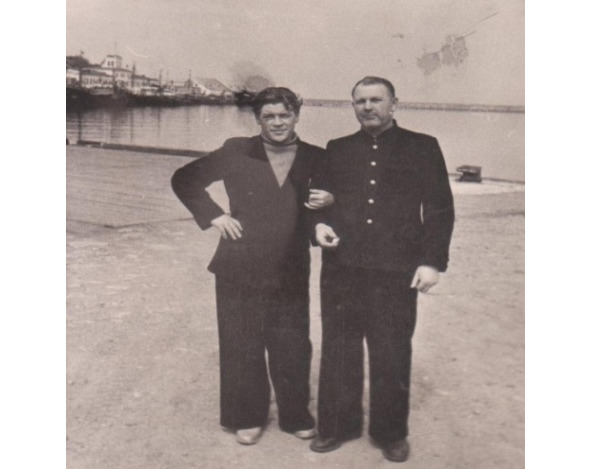
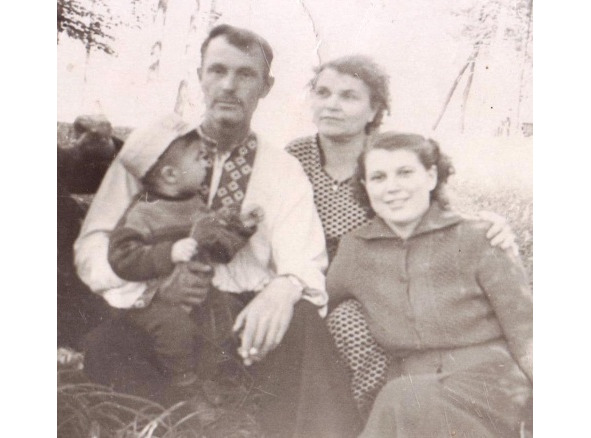
Then the Panfilov family went to Tyumen. I also remember dad getting money for the team. I took them to the newspaper and in the net through the ravine, and my mother gave money to the wives of fishermen. I was 11 years old.
The captains of my childhood are Azarenko, Gorbachev Nikolai Petrovich, Dubrovin Titus, Medvedev, Chechetkin Arkady Vasilyevich, Firsov Alexander, Zimovin, Novostavsky, Ivanov, Yermolayev, Burdygo, Lysenko Ivan. Ivan Lysenko was a Hero of the Soviet Union. With his wife Anna and son, they lived in our house. I remember that his the Party sent somewhere to the East. And they left as a family. In the previous photo in the port are captains Yermolayev and Khoroshavin. I remember the mechanics — Markov Ilya, Baltukhov Vasily, Tilman Ludwig, Tabakov Nikolai, Balagurchik Victor. My brother Khoroshavin Nikolai was also a motorist and mechanic. The heads of the UTF were Ermoshkin, Sobolev, Kashirin. In this photo, which was taken in July 1957, Misha’s grandson was one year old.
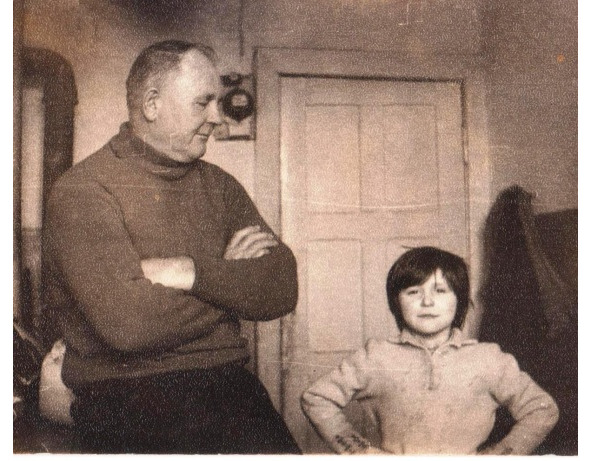
Nikolai Andreevich has another granddaughter Galya. Pictured below in 1971, she shows her grandfather how to dance at a kindergarten party. Two great-grandchildren. Nikolai Nikolaevich walks in the sea from Kaliningrad on ships under someone else’s flag. There are two other
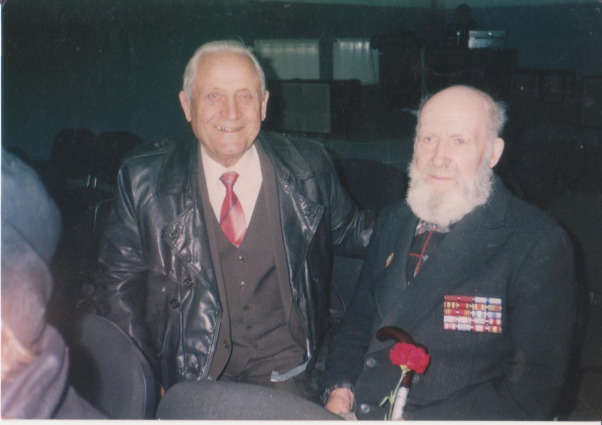
great-great-grandchildren — Alexander Nikolaevich is studying at the school for mechanics and Dmitry Mikhailovich is studying to be a navigator. Soon too will go to sea.
I would like to remind you about Captain Gorbachev Nikolai Petrovich. He’s a member of Great Patriotic War. He has the Order of the Red Star. During a storm in the Baltic in 1949—50, they in a trawl brought on board a bomb with iprit. The captain did not allow the team to her, and he suffered for it. He went to the hospital, four fingers were removed on one hand. Eyes began to see badly. Uncle Kolya had to go ashore. He started working in the control room.
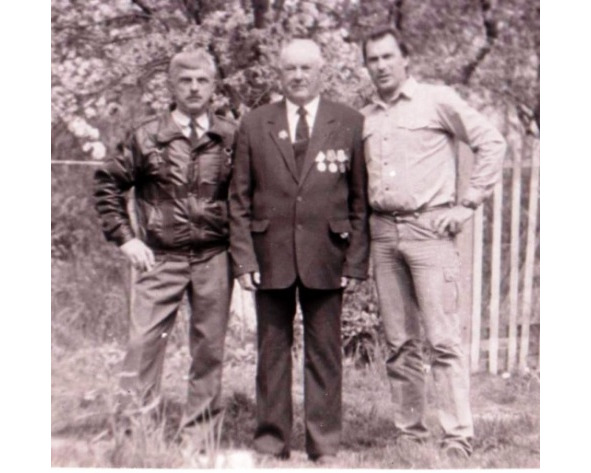
Mikhail’s grandson Mikhail Kolyakov worked for a long time as a cargo assistant to the captain of the “Ural Mountains” from Reftransflot. The newspaper “Mayak” No. 6 (3895) of February 11, 1992 placed a photo of Mikhail Vasilyevich, when he was in charge of the work on the delivery of fish products in the port of Kaliningrad. The author of the note describes Michael as a neat and thorough person.
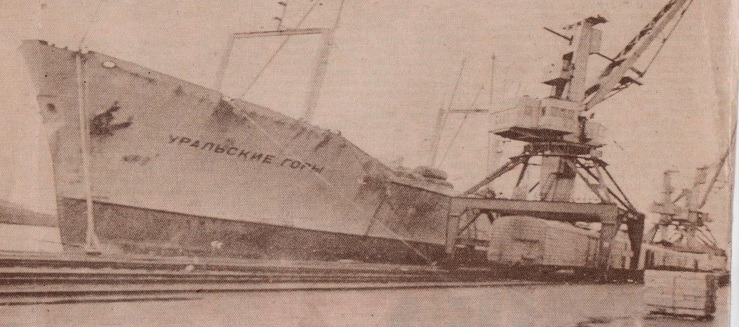
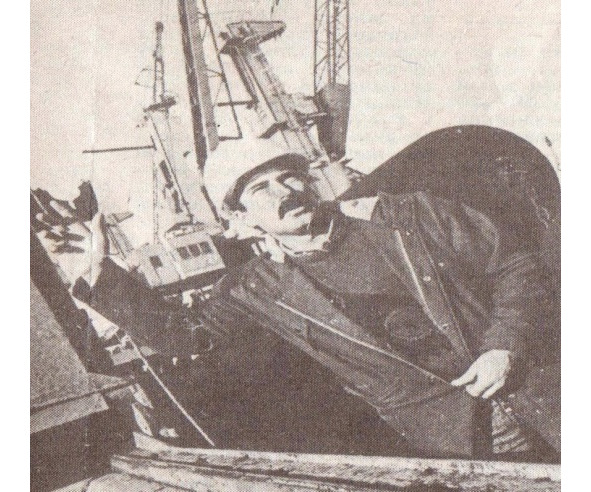
Tamara Nikolaevna looks very good in her years. She keeps as a memory everything connected with the family Khoroshavins. She is sure that the second edition of the book about the Pioneers base of the ocean fishing fleet will see the light of day and find its sponsor, which will allow presenting the book to still living veterans of the base. It just so happened that Tamara Nikolaevna was left alone. Her second husband, Nikolai Petrovich (pictured below), also died. He worked as the captain’s first assistant at Reftransflot. And his father, Khoroshavin Nikolai Andreevich, died on May 9, 1994. Beautiful children, grandchildren, and great-grandchildren help to live on.
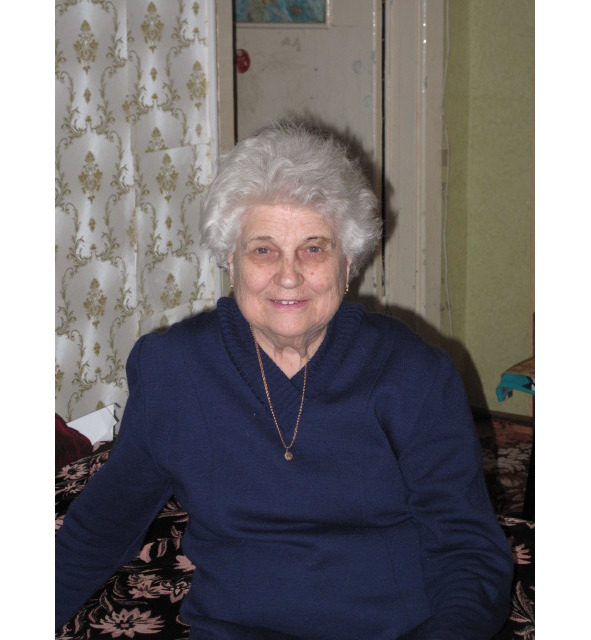
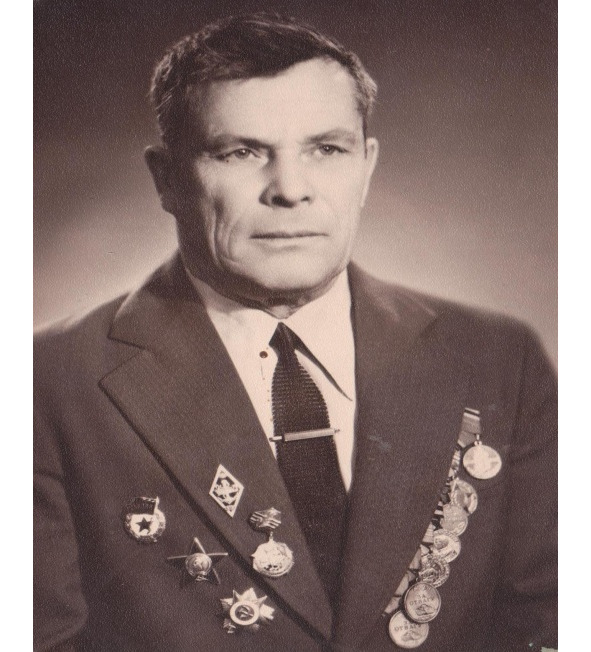
In July 1949, the first herring expedition was organized. Every worker who works for a young enterprise has sought to bring a part of his work into the common cause. People tried to do more in a shift.
UTF fish production figures for the 4th Five-Year Period (1946—1950)
Year According to Plan (tons) Actual catch (tons)
1946 1054,7 1060
1947 1112,8 1245
1948 4108,45 7630
1949 6065,8 5880
1950 11085,0 10900
Total: 23426,7 26715
In 1951, the first six SRT-class vessels built in the GDR arrived. This is the Sag Neptunwerft plant in Rostock (GDR). The average fishing trawler was rivete without a guarter-desk. Characteristics of the vessel: length — 38.5 m., width — 7.2 m., precipitation in cargo — 3.1 m. Water displacement is the largest — 436 tons. The payload is 110 tons. Autonomy — 25 days. The main engine has a capacity of 300 hp. The number of beds is 26. Speed: 9.0 knots.
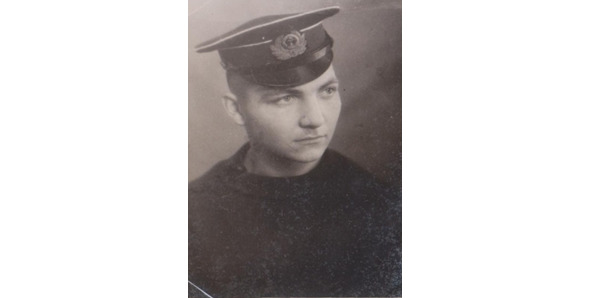
On one of these vessels — SRT — 618 “Bear” I went on my first fishing voyage.
For the first time, UTF fishermen began to fish herring in the Atlantic Ocean for 4 months. In the same year, they are the initiators of the production of products of an improved range — herring special ambassador. Fish production increased to 12.81 thousand tons. They did not forget to think about the leisure of fishermen in the UTF.
In 1951, the Fishermen’s Culture House opened in Pioneersk. It became a place of attraction for fishermen during the period of parking in the port.
In 1949, the future captain Dergachev, Albert Anatolyevich, also got a job at UTF.
I was a senior assistant captain at the SRTM Sun. He was remembered by absolutely everyone who knew him. But I wasn’t destined to go to Iraq with him.
Evgeny Gushchin, a member of the Pioneersk Association of Sea Captains, speaks warmly of Dergachev. At the SRTR-9092 Opochka, where Dergachev was the captain, Evgeny came as the captain’s third assistant. He worked with him for a long time. On the same ship Eugene climbed the captain’s bridge. Much can be said about the cheerful and hard-working captain from Odessa.
I offer you a note about Dergachev “Memory of a Friend” of the veteran of PPORF, senior mechanic Ershov D.V., which he wrote in my blog. I follow the author’s style.
“In front of me is a photo. Albert Dergachev. It’s just Alik to me. On the backside of the photo, I read: “In memory of a friend… etc. I see not just letters written on paper, so dark, immovable, on white photo paper, and I see instead of the images of voluminous, colored, movable. Now I live with these memories. This is it — everything before my eyes.
In mid-October 1949, according to the schedule, a passenger train “Odessa — Moscow” started from the Odessa station. In one of the seat wagons, there was a group of recruits to work in the city of Kaliningrad in order to replenish the ranks of the fleet of the fish industry. Dergachev Albert was also part of this group. This nineteen-year-old boy studied at some art school for a year and had to leave for material reasons. He earned the three on the courses and therefore was deprived of scholarships.
By nature he was a romantic with a soft docile character with a humorous bias. He occupied the bottom shelf in the compartment and immediately pulled out a notebook and pencil. He put it all on the table. After drinking a regular cup of tea, Albert took up a pencil and began to work on a notebook with detach sheets. Soon there was a sketch, which depicted a glass of tea on the table and a hand next to it, showing a combination of three fingers. With some sly indifference, he tore off a leaf and left his in the middle of the table.
In the neighboring compartment behind the partition unfolded events of a other nature. Someone Nikolai Savinkov with a guitar in his hands, squirting a song about how “once on the train sat one military, ordinary businessman and a smart man. He was a lieutenant, and for ladies’ pens he was a general.” Everyone sitting in the compartment listened attentively to the song. Albert joined them. Next Savinkov in the next song told about: " … how people get married and how they live…” with the promise that “the bells will sing about it now.” And the song ended with the edification: “Oh you, men who are gullible of you, do not abandon your wives for an hour, and if you leave, it is plaintively not howing, when the house gets a brownie.”
And the train was moving further to the northeast while in Ukraine. At each station, the sellers, approaching the train, tried their best to sell their goods. Mostly it was fruit. This year was a success for the harvest of apples. There were a lot of apples and some passengers cheaply took apples with bags for arrival in Kaliningrad. Albert also bought a bucket of apples straight with a bag. And by the evening there was a picture in which the apple with two plums on the sides was flaunted. The apple was with a human face and the signature “Still muzzle” at the bottom.
In Moscow, the group moved to the train Moscow — Kaliningrad, where and arrived in this glorious city, where he had to work and live. The city was struck by the devastation caused by the war. This is what the destroyed Carthage imagined in the imagination according to the description of historians. But at the same time he drew attention to himself with his green attire. This is a real garden city in ruins, a garden in which among the great variety of the plant world flaunted apple trees, abundantly decorated with fruits. There was a certain primness in this. And the weather was so fertile. Almost like in Odessa. Exactly, as in Odessa. For there very often in autumn, for the second time in the year white acacia blossomed. Here in Kaliningrad in October 1949, the white acacia blossomed, apparently, for the second time.
Romantics from Odessa liked the city of Kaliningrad very much. I also liked the bazaar, which unfolded in the square “Three Marshals”, now it is Victory Square. Right on the asphalt from the litter flaunted an incredible variety of goods, where the different people, military and civil species. One man drew attention to himself with his homeric laughter, looking at some weight. Newly-baked Kaliningraders paid attention to it with perplexed curiosity. The man, waking up, turned to onlookers from Odessa:
— You know, I bought from the grandmother for only 50 rubles, that’s. Understand? It’s a 200 gram weight from the standard. Do you understand? No, you don’t understand anything. It’s platinum. The pla-ti-num! he exclaimed, shaking his weight. I’m a physics teacher. It’s clear to you. That’s it.” He turned and went about his business.
The bazaar is probably really good, since even platinum weights are sold, and even so cheap. But still it can not be compared with Odessa “bring.”
We lived in a hotel for three days. It was located on Chestnut Alley. Every day we registered on Tchaikovsky Street, where the Baltgosrybtrest was located. Then part of it young people were sent to the village of Pioneersk, where UTF (trawling fleet management) was located. The UTF was greeted with joy. The head of the human resources department Anufrievsky greeted everyone personally, shaking hands. He turned out to be a polite, good-natured and optimistic man, quite mobile. His appearance was very similar to that of the brave soldier Schweik from the illustration in Hasek’s book “The Brave Soldier Schweik”. He’s not old, but you can’t call him young. They said he was an superintendent at the front, an officer.
Albert Dergachev at the audience for a long time carefully looked at Anufrievsky and when he left the office, took up his notebook and for fifteen minutes drew something. Then he quickly went back into the office, clarified something about the trip to Tallinn. Almost the whole group of visitors was sent to receive ships in Tallinn. This time Albert thoroughly took up the pencil and fifteen minutes later on a piece of notebook appeared a portrait of Anufrievsky in full-face with a striking similarity.
In the afternoon, deputy head of UTF Belokurov announced the sending of the entire group in 3 or 4 days. In the meantime, they took the bus to the hostel, which was located in Primorye. The next day four of the group of Odessans decided to go to the forest. These young people have never seen the forest before. Fortunately, there’s a forest nearby, why not see it?
It is said — done.
They went in, saw some mushrooms, even beautiful ones. We can carry as much as we can in our hands. It didn’t seem to go far, but we got lost. We went out on the road, but do not know where to go. The old man met us and explained, where to go.
— “Where will you from be? — grandfather asked. — Yes, we are newcomers, from Ukraine, get a job at sea on a fishing fleet. “Ah, so you need Neukuhren. It’s just there down this road. Grandfather waved his hand, pointing the direction. We went on this road in the specified direction. We reached the village with the name Raushen and there we found out that we had to go in the opposite direction. That Primorje is Gross Kuhren, and Neukuhren is Pioneersk. A soldier intervened in the conversation, who was going to Klein Kuhren via Gross Kuhren. He serves on Brusterort and offered to let down, he says, the place empty. So we reached Gross Kuhren (Primorje). In the dormitory met us a lot of questions: where were, what saw, why so long? The roommates politely invited to taste what they prepared on the occasion of a new acquaintance.
Someone Zjablesov talked at the same time:
— Eat, guys. It’s not fishy, but it’s fragrant. I prepared, just like at home. They brought fish here, but I cooked a whole pan, all had enough and even remain. It’s not known now where to put. Two days later, the commandant of the hostel announced that tomorrow the group should appear before the chiefs ready to leave. What and was done. A gloomy morning of the October months they arrived in Tallinn. Five new vessels such as MRT of wooden hulls were moored at the port. All had fish names: Nelma, Shark, Kizhuch, Octopus, and Medusa. Albert Dergachev was on the MRT “Nelma” where the captain was Polyansky Semyon Davidovich, a young man of short stature, medium fatness, a graduate of Kherson maritime school. Pious, moderately loyal, courteously demanding, Jewish in origin, and, of course, not devoid of humor. He was originally from Odessa, and that says a lot. Due to lack of people, minimal teams were organized, able to drive the ship to port Pioneersk. And there the teams were supplemented to the full squad of 11 people. They were equipped, supplied, and urgently left for the Baltic. The country needed fish. MRT-268 “Nelma” has passed all stages of education and already in November 1949 a strong team was created, united and friendly, but with one feature. The peculiarity of this was that all Nelmmov names were given to be Jewish, regardless of their actual nationality. The initiator of this idea was Dergachev or in Hebrew Beanya (a sailor in a ship’s role), Monya — a motorist, Izya — a sailor, Abram — radiooperator, master of extraction — Laiba with the prefix “Old”. There was also Amya, Moni’s friend and countryman. The actual name of Mosti is Ivan. Ivan’s name by origin is also Jewish from Yokanaan (gift of God), but it is not sound in these conditions. Monya and Matoia arrived in UTF together and they are both from Vologda province. Monya in Murmansk studied to be a motorist. In the personnel department of UTF, they were received by Inspector Maria Vasilyevna Kameneva, former secretary of Sergei Mironovich Kirov during the events in Astrakhan in 1922. When they filled out the questionnaire on Ivan, Maria Vasilyevna asked:
— Are you Russian?
— “No, I’m Harowski,” he replied.
— What kind of nationality is that? She was perplexed.
— “Yes, I do.” He is Russian, and I am Kharovskiy,” Ivan said, pointing to a friend.
— “Oh, don’t listen to him. He’s Russian, but only from the Kharov district, and I’m from the Russian district. There are such areas in the Vologda region.
Pavel Kirov, a countryman of Beni, had the pleasure of visiting a friend on “Nelma” in one of the parking lots anchored in the inner raid of the Baltiysk. Usually, the ships ran on a raid, hiding from the weather. Ships were anchored, moored to each other, and went to visit. Pavel was greeted very kindly and even with a concert, and he was surprised and amazed. — “Here, meet. The handsome man — a gift to Indian women on the day of March 8 — introduced Albert to the community and himself in a new capacity.
— “In order to you know. I’m Benya, this is Monya, here’s Motya, Izya, Abram. Meet. No, I’m not that Bene Creek. I’m just Benya, and there’s Old Leiba in the corner. In order to you know. We have time to rehearse, and now you listen to our “Jewish march” first.
And that’s when it started. Abram took out the balalaika. Monya, Motya, and Izya took out the combs, attached the tissue papers to the combs, and began to make sounds from the famous song in Odessa “The old lady hastily crossed the path.” Benya was drumming on something like a pot. It turned out quite collapsible, and even all the participants at the same time experienced pleasure.
— “Now listen and appreciate the overtures from the opera ‘Carmen’ by our orchestra,” Benya said, and waved his hand. This struck Pavel with the likeness that skidded back to the gallery of the Odessa Opera House, when, having received a scholarship, he and his classmates together bought 2 loaves of bread and a kilogram of halva, satiated, listened to the opera “Carmen”. It was 1948 hungry year. And now, in this place, in these conditions it was amazing. These guys achieved what seemed to be incredible. It’s in a cubicness in such a cramped way, with tools like that, and that play it.
At the end of 1952, Albert Dergachev was sent to the SHUKS (Mamon Academy, navigator training courses). Then there was the correspondence department of the maritime school. In 1960, he became the captain of the SRTR — 9092 Opochka. In the spring of 1963, a meeting of the Svetlogorsk City Committee of the party was convened, where friends, Albert Dergachev and Pavel Kirov met… — “Oh, hello! I am very glad to see you. Are you also a member of the town hall or what? — Pavel said.
— “No, I don’t think so. I’m kind of a guest. Invited here.
— Well, tell me, like life, what is new?
— " I came from the seas, it seems to have worked well. You probably know everything. Our wives work together, and children are in the same class. But we don’t have to meet very often. You, I know, are a donkey on the shore. What’s going on?
— You know, they asked to organize a fuel shop at the workshops and got stuck, for a year now. The first secretary of the town hall Zubkov appeared in the hall, and the procedure of the meeting began, interrupting the conversation. At this meeting, the captain of SRT-4507 Dergachev was elected to the honorary presidium. His crew fulfilled the plan by 125%.
After considering a number of issues of intra-party work of the party’s city committee, Dergachev was given a call to tell about the achievements of the team under his leadership.
— I can’t say that this year was out of the lungs. But the team, overcoming difficulties, had success. The team came together, cohesive, and worked skillfully. Everyone understood why they went out to sea and how to cope with the task. Everything was subordinated to the only goal — the implementation of the plan. The team tried. It was hard, of course. The Atlantic is not the Black Sea, where the fisherman Sonia moored the barkas in front of the sailor Bones. I am grateful for the attention of the meeting to the fishermen. It’s impressive and inspiring for the future.
— What are your plans for the future? The first secretary asked.
— The ship is getting on medium repair, and I am going to fly to Odessa for the holiday of the cheerful Duke, with relatives to see. And on arrival again in the sea, — Albert replied.
It’s been a while…
Pavel Kirov and Dergachev Albert met at the passing of Tuberculosis Sanatorium, where their wives worked.
— Well, how is Odessa? Pavel asked.
— “Oh, what can I tell you?” Odessa is Odessa. It’s still the same. I thought something had changed there. Although, yes. My brother-in-law and I went to Ilyichevsk. They built such a gorgeous fish port there. It’s a sight. You know, there’s even “Tropics” moored. There in Ilyichevsk i saw Volodya Voronko. He had two flights to the Atlantic and now wants to return to Pioneersk. Well, you remember, he was one of five captains who were transferred to Odessa on the orders of the Ministry. And at the “new bazaar” met with Ilya Tarasenko. This is the one that was the head of the mechanical workshops at the port of Pioneersk. He quit and went to his home country — in Odessa. At first, his relatives allocated not that closet, not the barn, where he temporarily settled. You couldn’t get a job without a residence permit, and there was nowhere to sign. For two months he fought — without a result. Then he took and wrote a letter to the Polish Embassy with a request to give his family the opportunity to emigrate to Poland overlooking the settlement and work. He has a Polish wife. He does not know whether the letter reached Moscow or not. But soon he was summoned to the hill party for a conversation, after which the family was put in a two-room apartment, prescribed and arranged to work as a master of the boiler-hull shop of the ship repair plant — Marty.
What’s yours? — “No change,” Pavel replied. — “I often see your offspring in kindergarten. Your daughter’s all about you, you’ve been ridiculed. The nurse in the kindergarten is Nadezda Platonovna. And your daughter called her Odezda Pantalonovna. And this sweet woman, having become snugly, said: “You won’t get bored with these nice people. — “Yes, I remember, I want to tell you,” Albert stirred. “When my brother-in-law was driving back, he took a burst of laughter. Understand? There’s a lady on the bus and she’s chewing on something all the time. Jora pretended to be looking at something under her feet. “Are you looking on what” — the lady asked. “I see your hooves,” he said. She was confused and moved with an indignant look and changed places.
The next meeting of friends took place about five years later. Workers in the fishing industry have a characteristic feature — not often seen. And in Kaliningrad, it is a common occurrence. It is not for nothing that Gazmanov’s song was born in Kaliningrad: “You are a fisherman — I am a sailor, you are a sailor — I am a fisherman, we will not meet in any way…". Kirov and Dergachev met at the fork of the streets of Portovaj and Worker in Pioneersk.
— “Hi! How many years, how many winters! Pavel Alberta welcomed. “Well, I’ll say, Buddy, how long since the seas? What’.
— Yes, I’ve had a lot of time to get bored. I am now a deviator at Pioneersk port. Smirnova Anka died, then me in her place.
— What’s going on?
— “I’m sick. Now I even eat vodka with pills, — Albert answered with a half-serious tone.
— “Well, you do! How long is all this going to take? Pavel asked,
— “I hope not for long. I’ll be back in the sea. As it is sung in this song: “You can’t find better seas in the world, you will survive everything in the vast.” Well, what’s yours?
— “It’s a week, like the seas. The ship has put on repair and himself in business to the ears. The apartment was given in Kaliningrad, so I move, I am developing new apartments. I’m living with it.
— “And here our lionesses are coming. Come on, live in the apartment. I hope we’ll see each other. So long. Good luck,” Albert said, and, taking theatrically under his Madonna’s hand, retired.
It’s been another four years. Pavel wanted to visit the places of his former habitat in Pioneersk. In a chance meeting with a friend Lyudmila Voronko, he learned about the death of Albert. She said in a conversation that Albert Dergachev died while going to work. He crashed right on the tracks near the train station. An ambulance was called, which confirmed the death from cardiac arrest.
Thus ended the epic of Albert Dergachev — the captain of a long-distance voyage, the father of two cute daughters and no less sweet wife, Odessa to the bone, a good amazing man. This man could compete with the famous Kukryniks with his parody sketches. I remember an incident in a hostel in Primorye. Albert, being in reserve, lived in this dormitory for a while. There ruled on the rights of the commandant someone Nikulin, a former military, a participant in the war, a tanker quite strict views. During his stay (three days), Albert left a sexual mural on the wall at the bed. And it greatly shocked Nikulin from what he saw.
— What’s this all about? The commandant asked.
— “Panno,” Albert replied calmly. Nikulin looked in silence for five minutes and finally said-
— “Well, wow. And when did you do it? Oh, my! Okay, let it be. And you, I see, mastak however.
Sudden death kills three million people in the world every year. An hour ago he was absolutely healthy and suddenly… It’s a shame for your friends. It’s a shame because the fact is my loneliness, to some extent. A friend went into another world, and now there is no one who can ask, “Do you remember?…” And can I ask him the same question? This is the loss of a part of the memory of the general, mutual, subjective. The feeling of peace in time and space from the past goes away with a friend. Although we know that above us Damocles sword hangs constantly from the ceiling on horsehair. And yet… Let the memory be eternal.
Veteran of PBORF — Ershov D.V.”
That odessa in the midshipmans uniform, who arrived in Pioneersk at the age of 19, could not identify any of the captains of the Association of Sea Captains of the base. Therefore, I set myself the task to find a photo of Albert Anatolyevich, on which our captains would not hesitate to identify the famous fisherman. And this task was helped by Albert Anatolyevich’s wife Galina Petrova. Don’t be surprised, reader they have different surnames. They decided so by mutual consent in their youth. Galina Sergeevna worked as a nurse in the orthopedic sanatorium of Pioneersk for a long time before retiring. Now she is often visited by her daughters and granddaughters. Galina Sergeyevna captured my camera on March 4, 2018. She is by nature optimistic, cheerful, and feels good. Love for her husband carefully keeps.
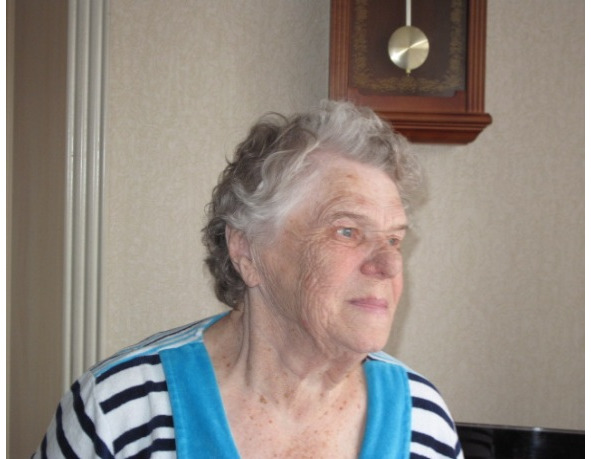
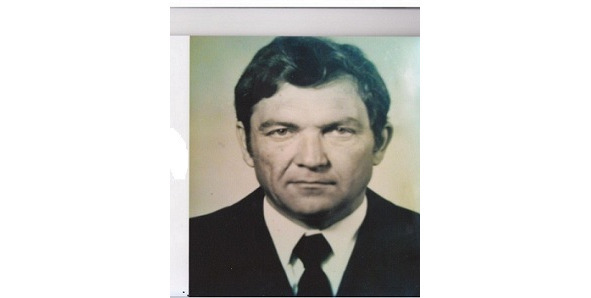
1951 — 1960. The arrival of young professionals, development of fishing areas. The first hero of Socialist Labour.
In connection with the replenishment of the fleet, the need for command personnel has increased. In Mamonovo, Kaliningrad region, in 1949, the school of improvement of the command began work. One of the first groups of ship mechanics were sent: Chenizhko G., Konachevsky A., Gibko, Kobzev A., Sukhanov S., Korshikov A., Tomachev A., Kochubey J., Nikonov, Bulavin, Kachanov, Lesov, Sesin S., Warsaw. In 1952, Viktor Nikolaevich Kashirin, who worked until 1960, was confirmed as the head of the UTF.
1953 is characterized by a large scale of socialist competition among the crews of ships of the North Atlantic Expedition and the Baltic. The best results were achieved: SRT-4130 (captain N.I. Sizov), who executed the plan by 110%, MRT-1 (captain V.G. Koroteev), who executed the plan by 132%. The socialist competition also unfolded at the Pioneersk fishery shop. The best in terms of production performance was recognized by a team of dried fish (from the word “to dry”) (Brigadier I.I. Murzina). The brigade performed production tasks by 180—250%. A brigade of sorters and packers (Brigadier M.I. Ladchinova) performed tasks for 150—170%. The winners of individual competitions were: of dried fish A.T. Bebeshko, the sorter A.A. Golubenko, loader A.E. Barantsev, cooper P.A. Makhov, who showed samples of Stakhanov’s labor. For the first time, in the Kaliningrad region at the Pioneersk Fish Factory, a batch of medical fat from cod liver has been developed. Since 1954, seasonal fishing has ceased. The extraction of Atlantic herring began all year round. This year it was mined 1.5 times more than in 1953. The equipment of the vessels with new engines has improved, their repair in the mechanical workshop has become faster than the Klaipeda and Svetlov factories.
On the basis of the order on the Baltgosrybtrest dated January 6, 1954, the Pioneersk Fish Factory merged with UTF. Victor Nikolaevich Kashirin became the head of a single fishing complex. 1955 is the last year of the fifth five-year period. Employees of the company sought to complete it with the best labor successes. Crew members of MRT-247 (Captain Ivanov K.P.) and MRT-255 (Captain Salikov I.I.) completed the annual task by September 26. 16 shipcrews completed the task on 112- 193%. The smoked products plan was 155.7%. UTF fish caught 905000 centners in five years.
Year According to plan (centners) In fact (centners)
1951 128128 127800
1952 124361 158 500
1953 128127 151200
1954 186332 221800
1955 231647 245700
Total: 798595 905000
In 1953, the graduate of the Klaipeda maritime school, the future Hero of Socialist Labor Arkady Fyadorovich Tsygankov, took his first voyage on SRT-619. On his first captain’s voyage he left in 1957, and in 1958 he was awarded the Medal of Labor Distinction.
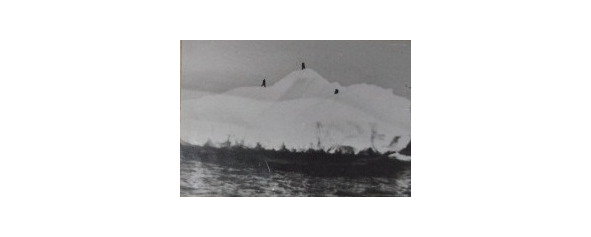
In 1958, the crews of SRT-1104 (Captain Karkanosov N.V.), SRT-1105 (Captain Smirnov V.P.), SRT-4478 (Captain Yukhnov P.T.), SRT-4220 (Captain Pustovoy V.Y.) were the first in our region to go to the shores of Canada sea in search of water. perch fishing. The fishing area was completely unknown and harsh. Constant storms, fogs, ice, icebergs made work much more difficult. The perch was at a depth of 200—300 meters. The area was rich in fish. For one trawling sometimes raised 30—40 tons. Crews of medium-sized trawlers with on-board trawling had difficulties with the processing of the catch. But they did well with it. The lack of drinking water was sometimes made up.. by icebergs. They approached them carefully and bunkered down as much as possible.
RT also explored the fishing area. So in February 1959. there worked RT — 216 “Pulonga” headed by Captain Kudrich N.V. And in the summer of 1960 the same “Pulonga” under the command of Captain Romanenko Boris Ilyich again went on a research voyage to the Icelandic region. I was lucky enough to be there as the captain’s third assistant. Ours, “Pulonga” and RT “Muksun” studied the fishing opportunities of the area. On “Muksun” there were scientists who controlled ours trawling and studied the composition of the catch.
As a result of the All-Union Socialist Competition, the award was awarded to the crew of SRT-4146 (Captain Ivanov), who caught 2590 centners, with a plan of 1390 centners.
The best crews among the SRT ships were SRT-4324 (Captain Akhmetov A.I.), SRT-4410 (Captain Sizov NI). Captains SRT-4324 Valentin Michailovich Bykov, SRT-4432 Dmitry Ivanovich Markov, the senior master of extraction RT — 216 “Pulonga” Prokofi Efimovich Gavorin, were awarded the Order of Lenin. Valentin Michailovich Bykov was the head of the base’s fleet department for a long time. The excellent leader had a constant huge authority among the base’s fishers.
Sizov Nikolai Ilyich, nine more people were awarded the Order of Red Banner. Among them — well-known employees of the base. Captain SRT-4295 Ivan Mihajlovich Zabebenin, UTF chief — Kashirin Viktor Nikolaevich, driftmaster SRT-4321 — Krayev Vasily Vasilyevich, captain of MRT-258 — Kucherenko Alexey Leontievich, captain of SRT-4477 — Novostavsky Alexey Yakovlevich, sailor SRT- 4410 — Adam Ivanovish Paskevich, captain of SRT-4166 — Salikov Fedor Pavlovich, master of extraction SRT-4324 — Solomevich Leontiy Konstantinovich, captain of SRT-4321 — Timofeyev Vladimir Andreevich. Sixteen UTF employees were awarded the Order of Honour. Among them are famous captains — Ivanov Mikhail Ivanovich, Kiryanov Anatoly Andreevich, Kuzmenko Arkady Nikolaevich, Prokhonov Sergey Mikhailovich, Tkachenko Vladimir Nikolaevich, Khrisanfov Anatoly Yakovlevich, Shishkin Ivan Evdokimovich.
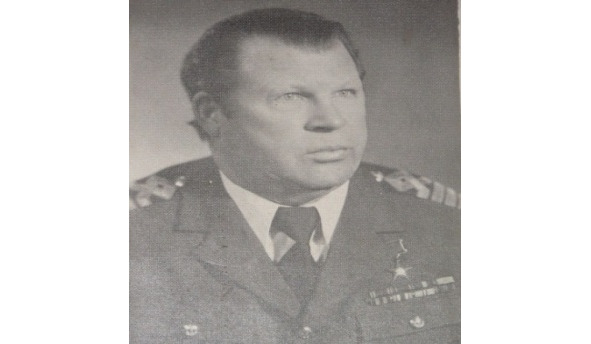
By decree of the Presidency of the Supreme Council of the USSR of July 1, 1958, Captain Sizov Nikolay Ilyich was awarded the title of “Hero of Socialist Labor” with the award of the Order of Lenin and the gold medal “Serp and Hammer.” Sixteen employees were awarded the Medal of Labor Valor. Among them are captains: Volodin A.A., Ishoev F.V., Kovelev E.M., Koroteev V.S., Kostikov B.P., Romanenko B.I.,
Among the twelve awarded the Medal of Labor Distinction are three captains. These are Zacharov Nikolai Yakovlevich, Kokovin Vasily Alekseevich, Tsygankov Arkady Fedorovich. In the late fifties, the base began to receive new excellent fishing vessels
Sizov Nikolay Ilyich. from the city of Stralsund (GDR) from the
plant “Volkswerft VEB”. They could fish with
trawls and nets, prepare salt and low-salt products. They were called SRTR of the type “Ocean.” Medium fishing trawlers are refrigerators. They had the following characteristics: length — 50.8 m., width — 8.8 m., precipitation — 3.4 m. Dedveit — 263 tons. Swimming autonomy — 30 days. The main engine has a capacity of 540 hp. The number of beds is 28. In October 1955, 15 navigators and 15 mechanics, fish masters and driftmasters arrived in the Pioneersk Base from the Guryev Sea School. Among them were the most famous captains of the future Islyam Mikhailovich Abdrakhmanov, Nikolai Gladov, Yuri Prokopievich Loginov, trawlmaster Kagay N., mechanics Jdankin, Lukavin.
Valentina Ivanovna Loginova was already the wife of Yuri Prokopievich. She started working as a technologist at a fish factory. Yuri Prokopievich went to sea for a long time as a captain, but because of illness he had to go to work in the port surveillance. However, a severe, incurable disease ended his life. It happened in 1990.
.
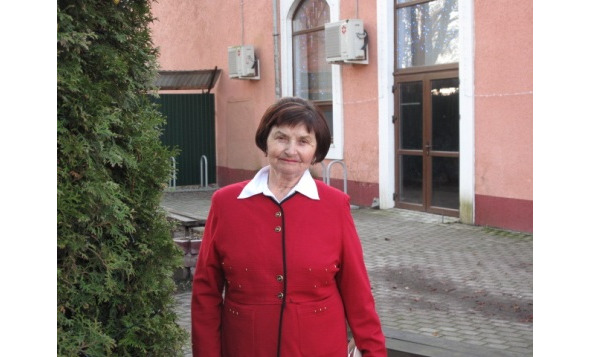
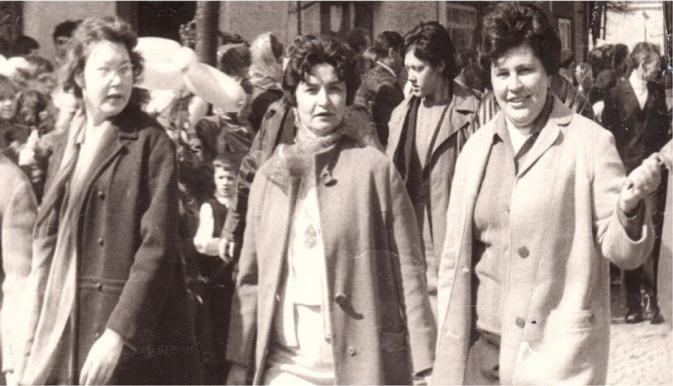
Yuri Prokopievich’s son, Michael, also went to sea after graduating from THE KMU. Captain Mikhail Loginov was a good “fish purse” at the Pioneers Base. But the heavy fishing, nervous environment of crafts undermine any good health. Diabetes mellitus in 2012 fall down and Michael. His son Eugene after maritime school also goes to sea and already works on the captain’s bridge. Valentina Ivanovna together with Dina Ananyeva Rakoid (wife of our wireless operator) and Biryulina (wife of the navigator) eventually organized a smokeshop. They produced excellent mackerel products — “kipers”. When the base began to fall apart into small parts, the CEO of Start, which was created on the basis of the shop, Lapin offered Valentina Ivanovna the position of deputy. She was engaged in the shipment of products to all parts of Russia. But it didn’t last long. The collapse of the base was catastrophic. Soon there was no fleet and raw materials for good products.
At Yuri Prokopievich Loginov on SRT as a senior assistant captain, I learned the basics of fishing. The newspaper “Pioneersk News” on the day of the fisherman placed a note about the work of Valentina Ivanovna in the base. “The veteran of PBORF, veteran of labor Valentina Ivanovna Loginova shares his memories of working at the city-forming enterprise. Valentina Ivanovna’s work biography began in 1956, when she was hired as a master of the processing shop at the Trawl Fleet Office. The Office consisted of fish-industrial vessels and fish processing facilities. In August 1963, UTF was renamed PBORF, at that time there were 75 ships in the database and 1787 man.
The tasks of the base and the processing shop, which included a smokehouse, a cannery, a utilization shop, a laboratory, a bond-tare site, remained the same — fish production in the North and South Atlantic, in the North and Norwegian Seas, reception, processing, smoking and implementation fish products. We worked in three shifts, four masters in each shop. The daily production of the processing shop was 20 tons of salted fish production. Valentina still remembers many employees. These are the masters A. Kandalova, M. Chernyshova, G. Kabarina, senior masters L. Potapchuk and I. Mahonin, chemist V. Biryulina, head of the laboratory E. Seleverstova, head of 1 workshop A. Petukhov.
In 1964, Valentina Ivanovna was already working as a technology engineer for the processing shop. Crews of PBORF vessels mastered new fishing areas, exceeded planned fishing tasks, high production rates of fish products demonstrated and processing shop — the best products were in demand not only throughout the Union, but also for Abroad.
Workers of the processing shop were provided with special clothes, fed in the dining room for 0.6 ruble, went to work by bus, used a comfortable household, locker room, a beautiful bath. The work was hard, but worked in good faith, the salary was received on time: on average 90 — 100 rubles.
It wasn’t just working life that was boiling in the port. Subbotniks, political information and production charges were constantly organized. We went to the farms to harvest hay, potatoes, cabbage. We took part in festive demonstrations, attended the evenings of rest. The team of the processing shop for winning social competitions has been encouraged by bonuses and trips more than once. I remember excursions to Brest, Leningrad, Tallinn. For several years, a choir of 20 people functioned in the shop. We rehearsed at lunchtime, singing mostly Russian folk songs. However, the most favorite song was “Sub-Moscow Evenings.”
So coincidentally, the heyday of PBORF became the best for V.I. Loginova. Her husband, J.P. Loginov, also worked as a captain at the port for 30 years. In 1985 he was awarded the Order of the Red Banner of Labour. The couple raised two sons, now Valentina Ivanovna has four grandchildren and one great-granddaughter. In total, Valentina Ivanovna worked for 39 years at the Oceanrybflot base. Continuing to talk about the beautiful people of our base, I can not mention D.G.Gritsuk and his wife Ekaterina Alexeyevna. I had to work with Djan Gavrilovich under his guidance for several years. The department he managed was always in good standing with the management of the base, KaliningradRybprom and even the “Zapryby”.
Djan Gavrilovich Gritsuk was born in Belarus in 1935. In 1956 he graduated from the Kaliningrad Maritime School and arrived in the direction of UTF. On the captain’s bridge of SRT-19 he climbed in 1962. He worked to Cuba. In 1972 he graduated from KVIMU and continued to walk in the sea. Conakry, Georges Bank and many other fishing areas. For several years he was a captain-mentor on the Navy. Then the head of the base Ahromeev offered him a job in the second department of the base. There he worked for 20 years as the head of the department. He retired from the base in 1995.
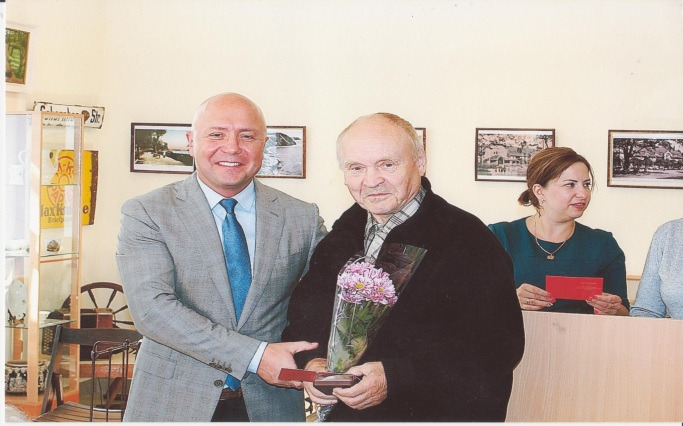
The above picture was taken in 2015. Djan Gavrilovich’s wife Ekaterina Alekseevna, born in 1937, started working at a fish factory in 1957. They married in 1958 and were due to celebrate their wedding anniversary in 2018. 60 years of amicable life together. Ekaterina Alexeyevna moved to work in the accounting department of the material department from the fish factory. Then she became deputy chief accountant. She and her husband quit the base. Is not this an example for young people for marital fidelity for so many years of life?
And on October 2, 2018, at 10:47 p.m. Moscow time, I posted a “Day of Sorrow” entry on my blog under a burning candle. “To all who knew the Veteran of the Pioneers Base ‘Oceanrybflot’ Gritsuk Djan Gavrilovich, the most beautiful man, leader and family man, I inform the sad news 02.10.2018 we buried Djan Gavrilovich. A month earlier, his wife had passed away.” That’s how quietly and discreetly go into the other world of famous veterans of the Pioneers base “Oceanrybflot.”
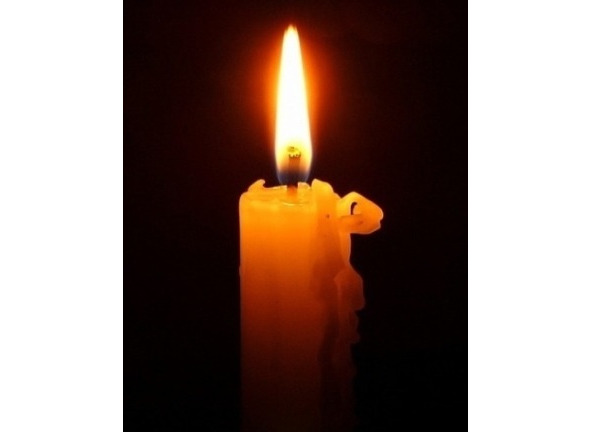
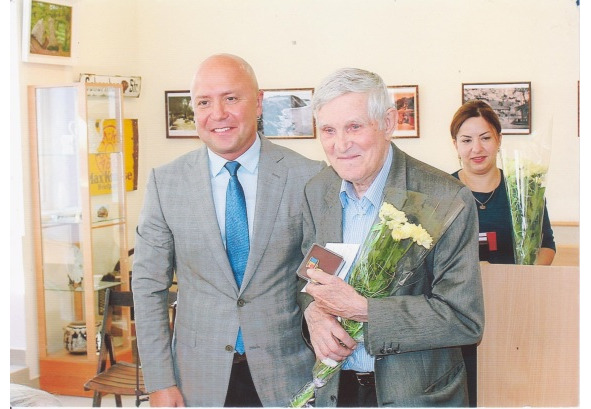
In 1960, SRTR-9015 and SRTR-9016, where the captains were Markov D.I. and Smirnov V.T., were converted to tuna fishing. For four years they were fishing off the coast of Africa.
In the same year, Vasily Popov was confirmed as the head of the UTF. The number of UTF employees was more than 3000 people, and the fleet numbered 72 ships.
In December 1960, a floating workshop of PM — 1120 arrived in Pioneers from Stralsund to repair fishing vessels.
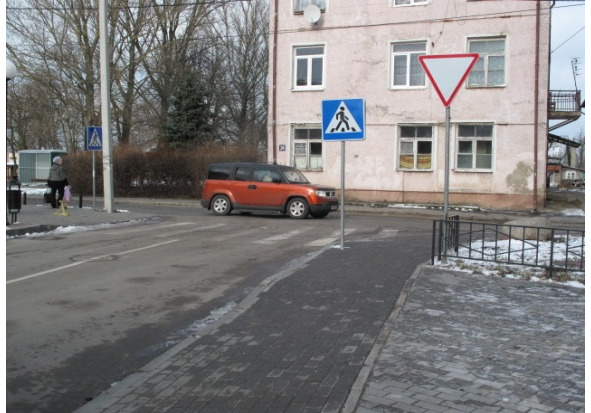
Бесплатный фрагмент закончился.
Купите книгу, чтобы продолжить чтение.
